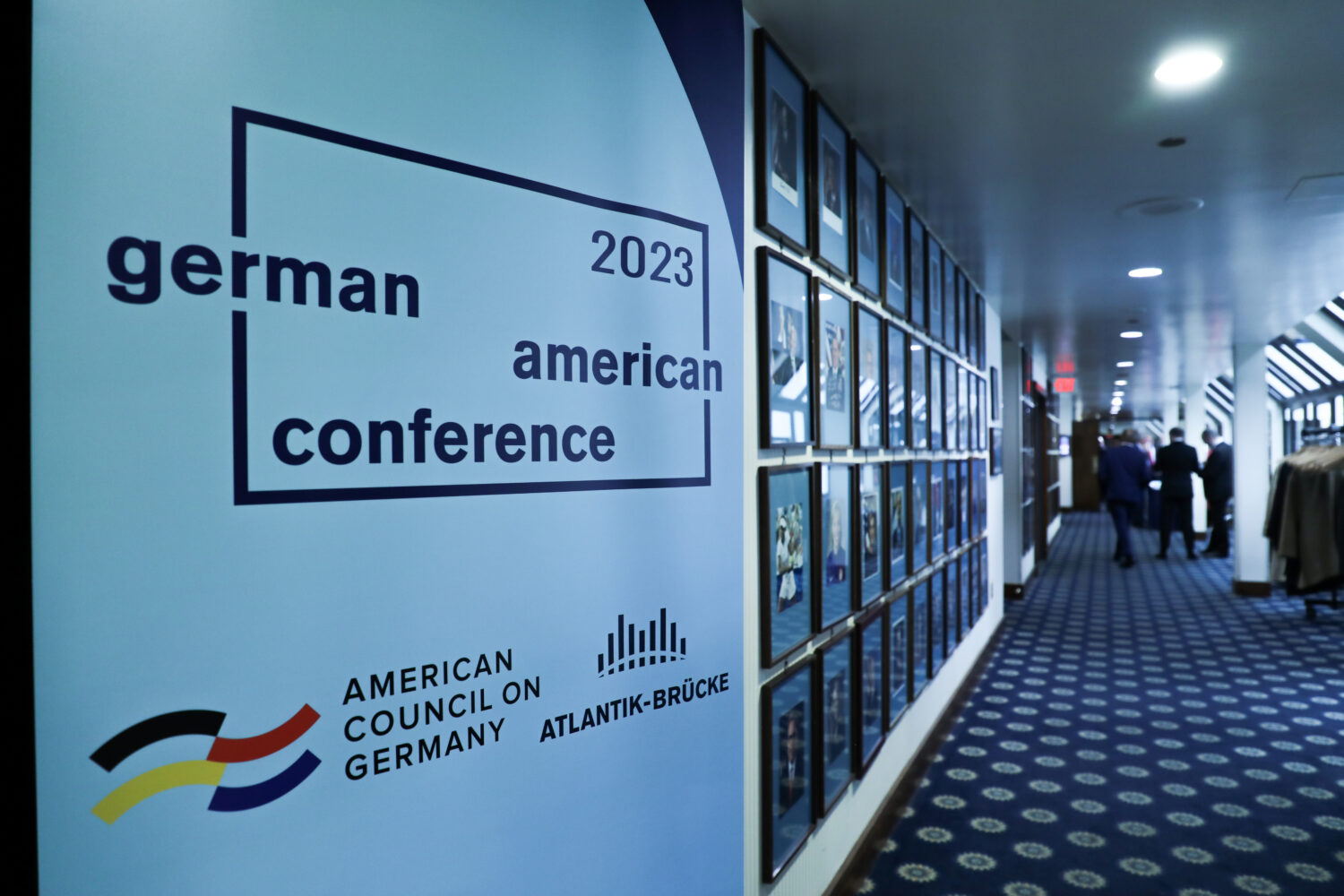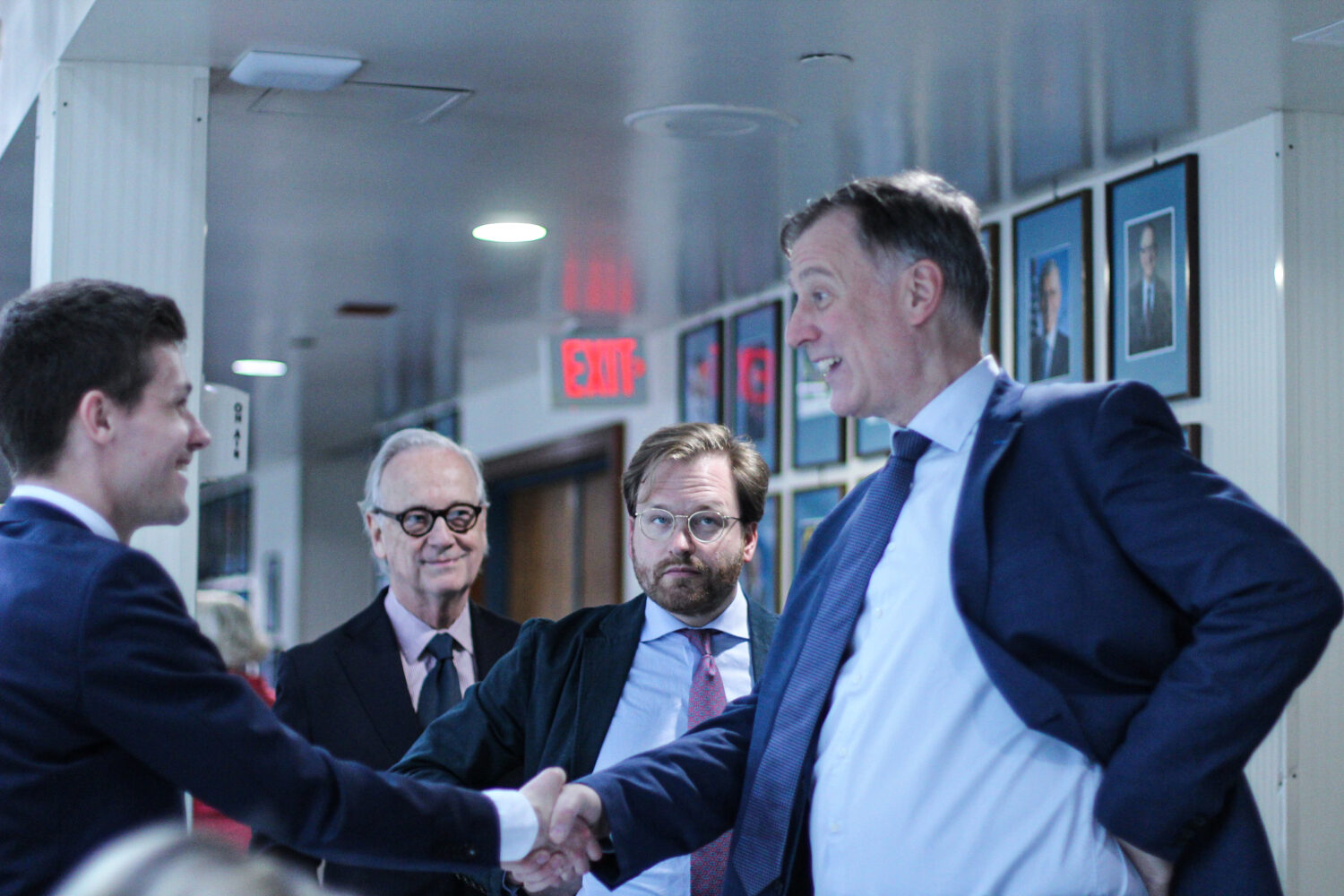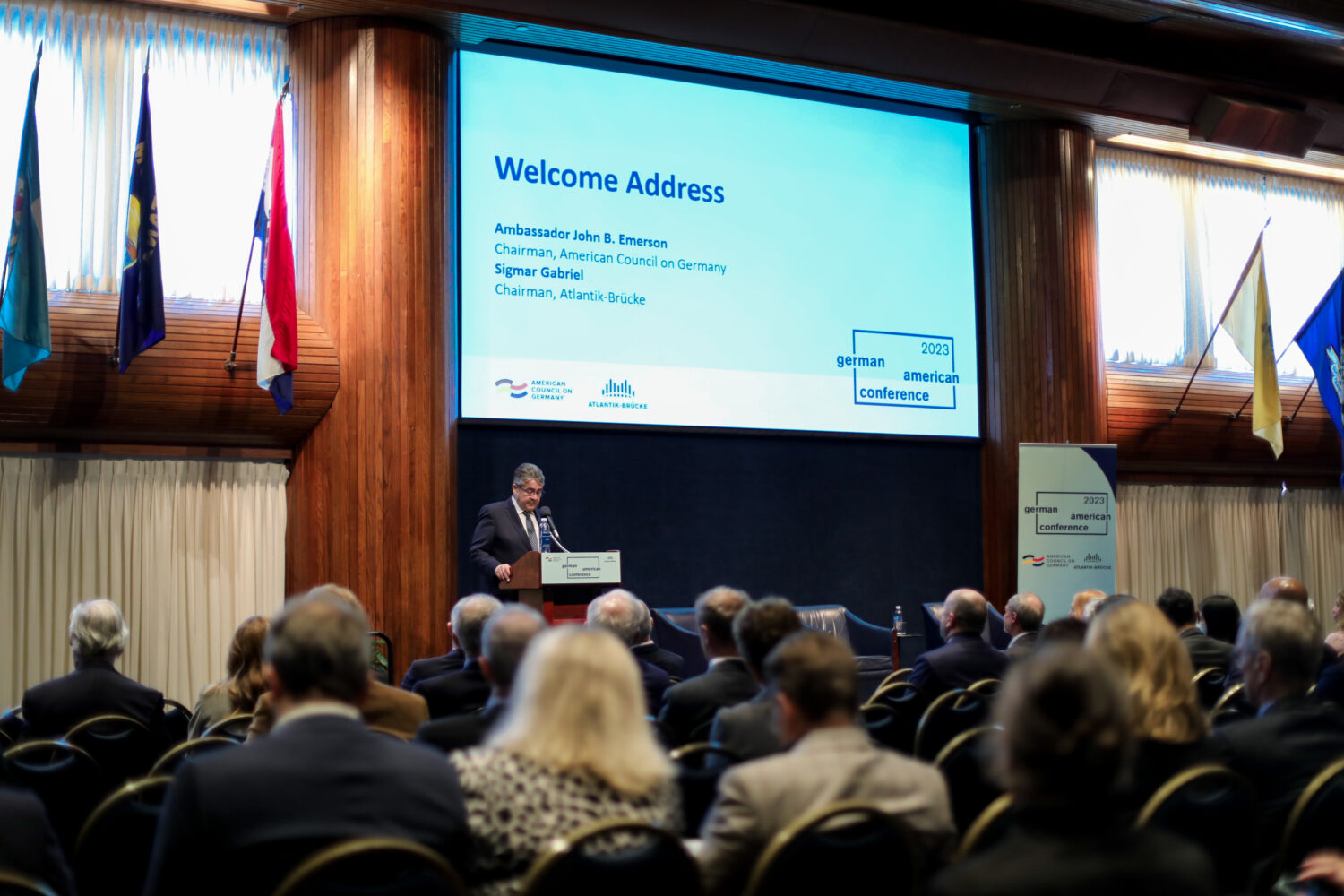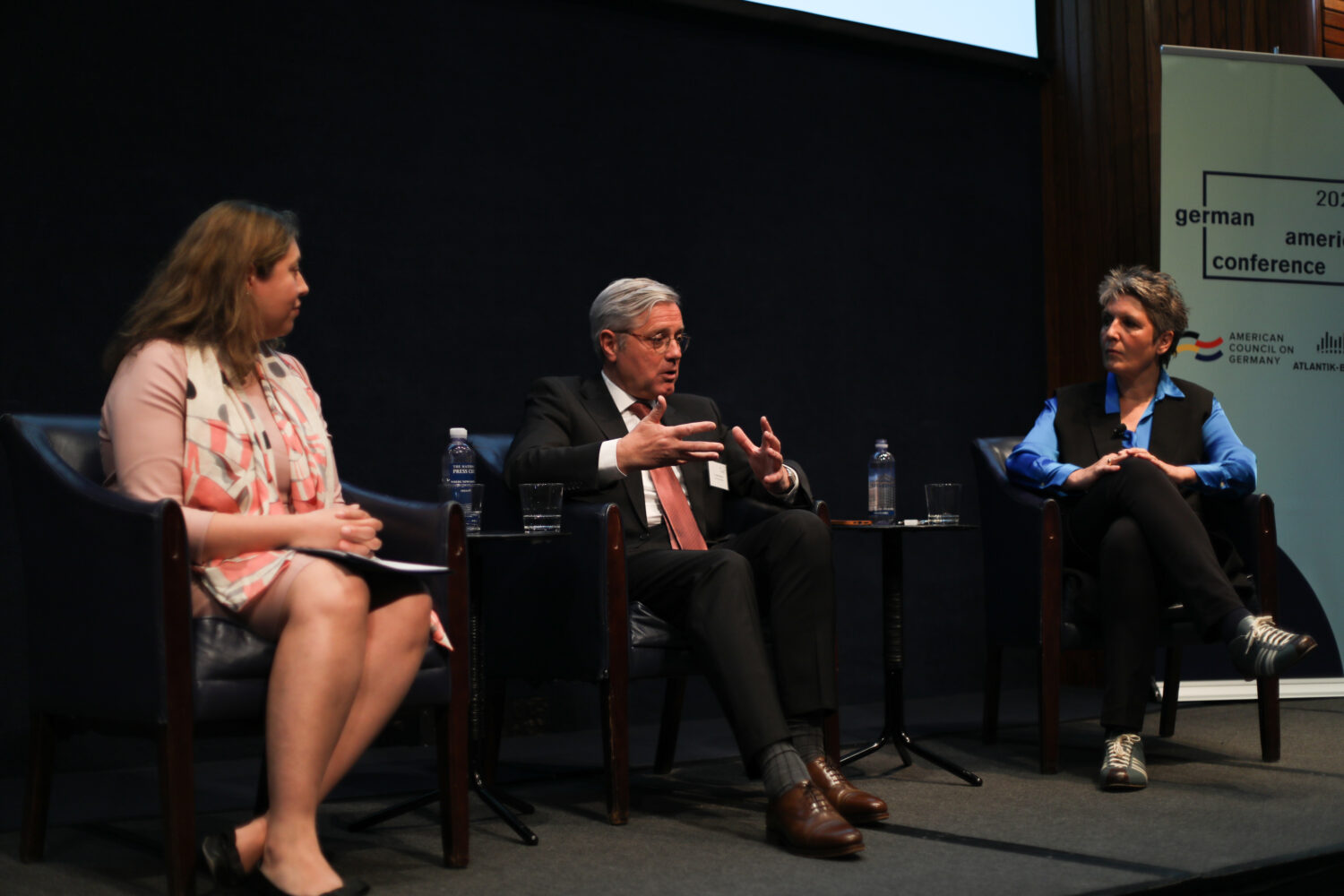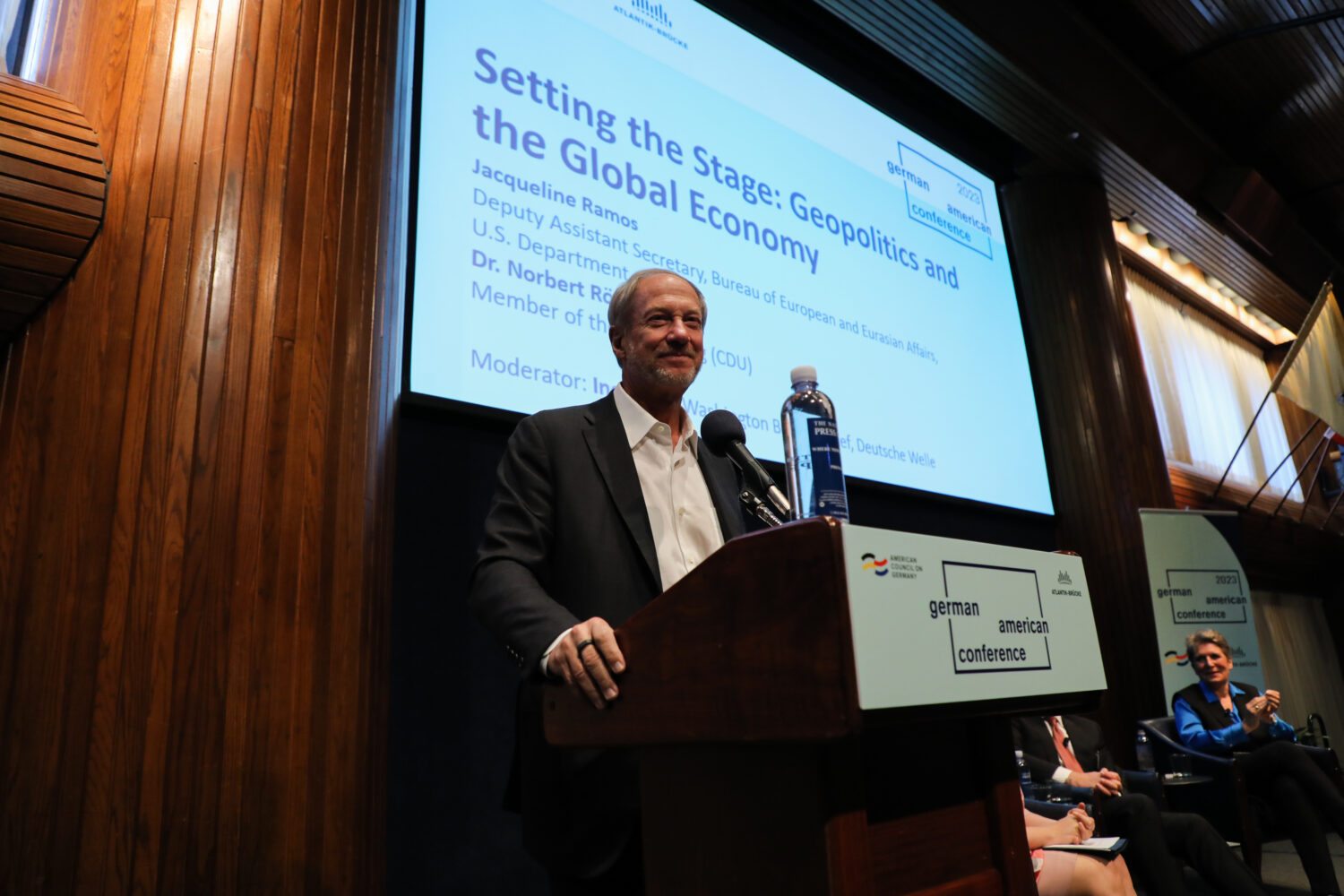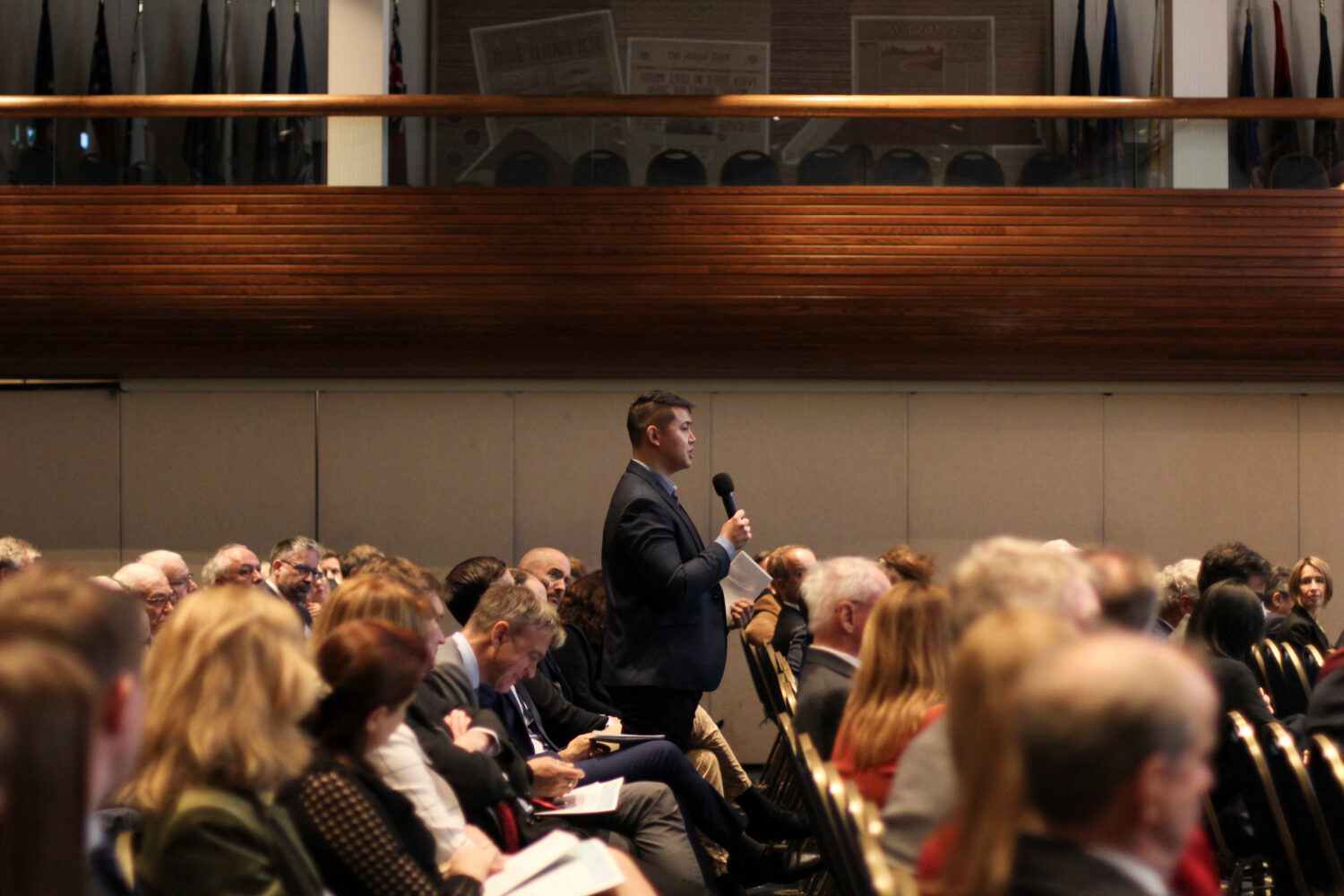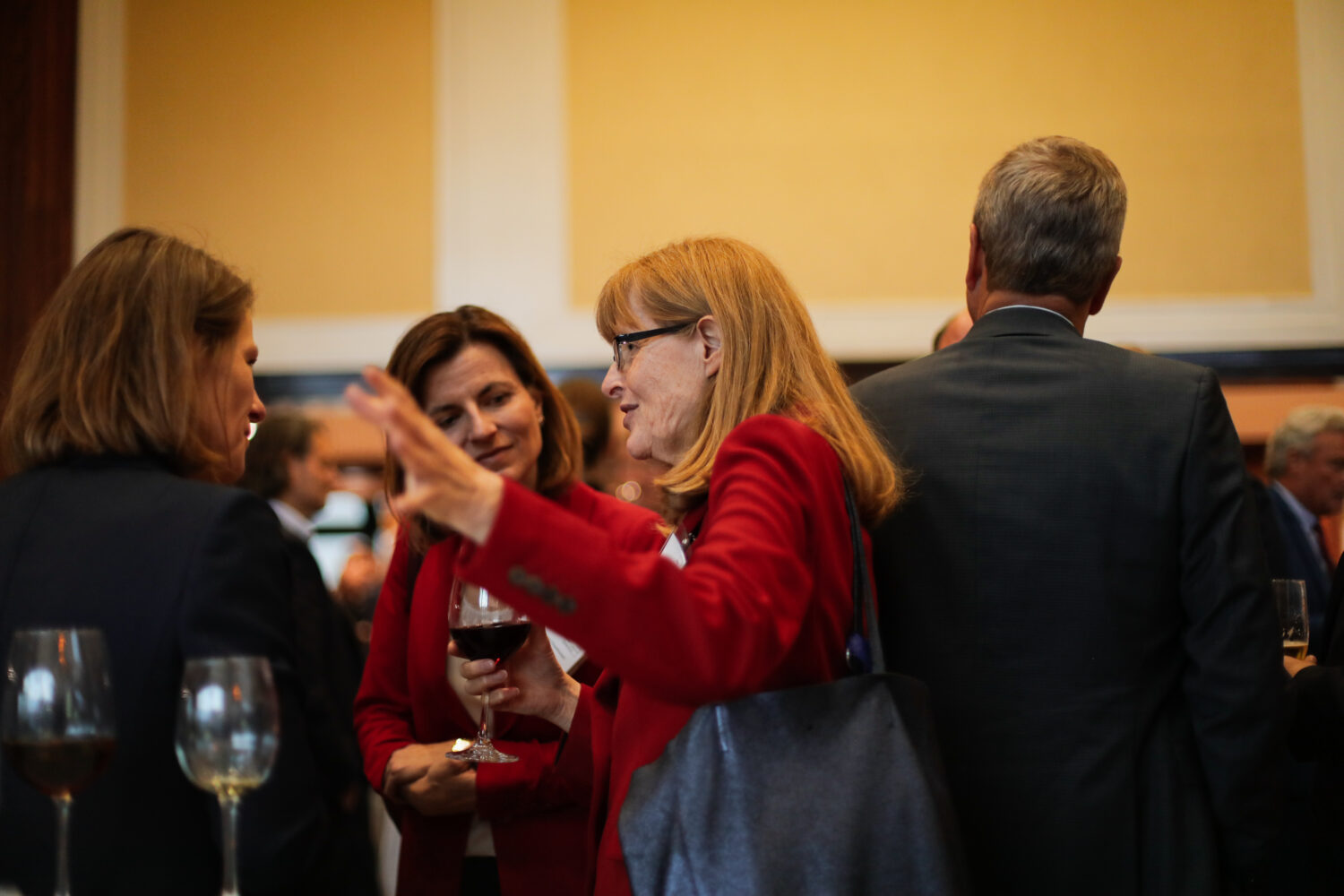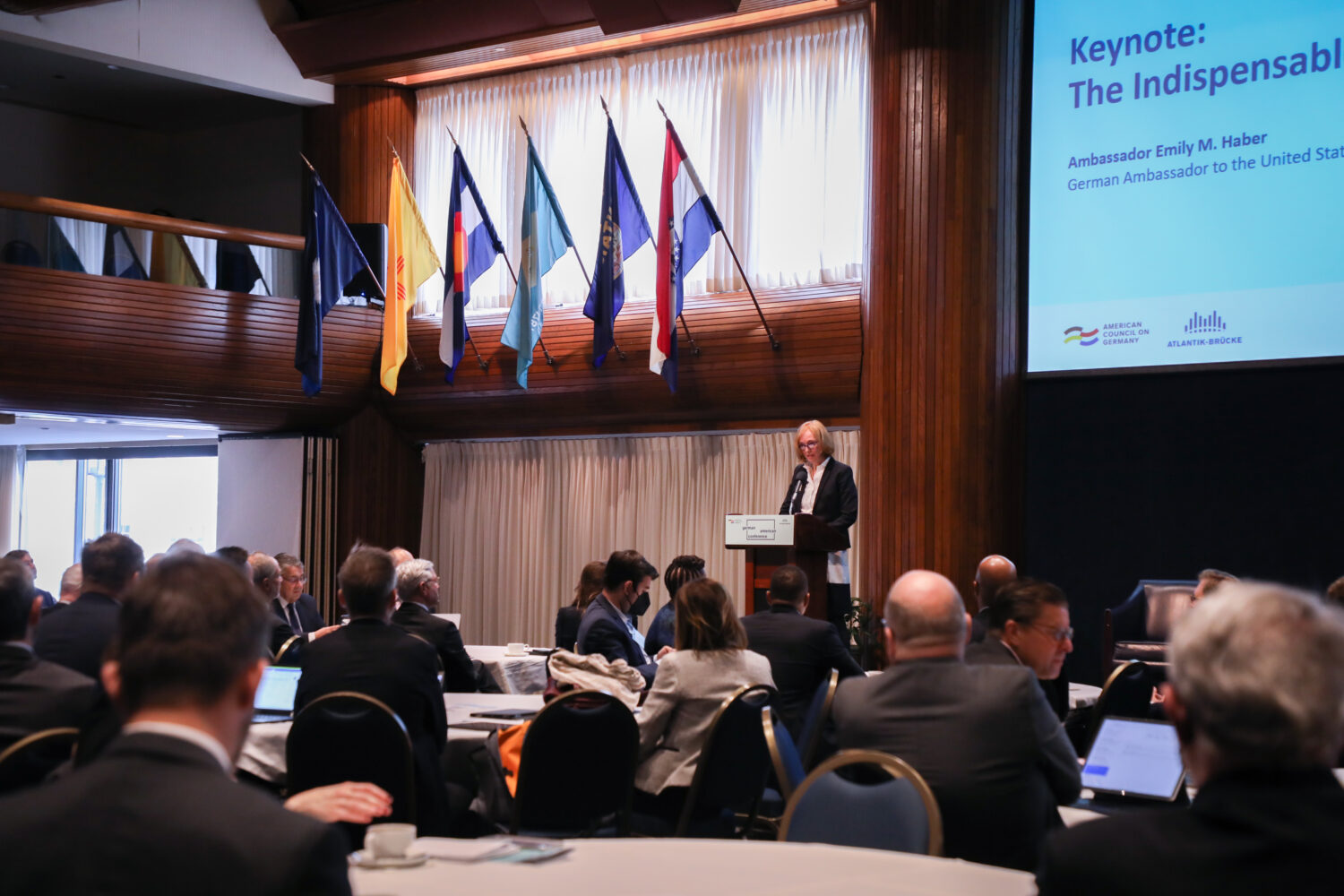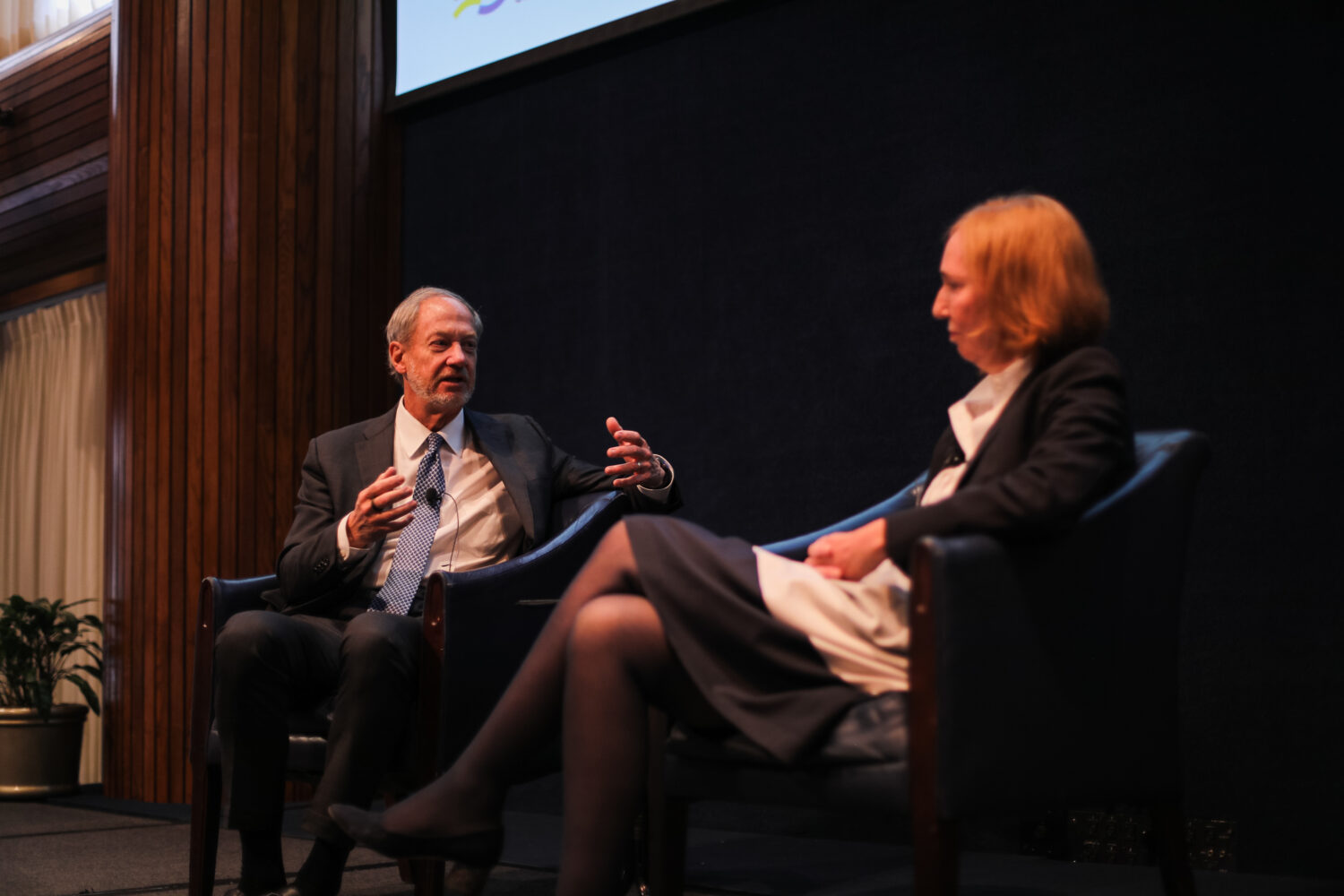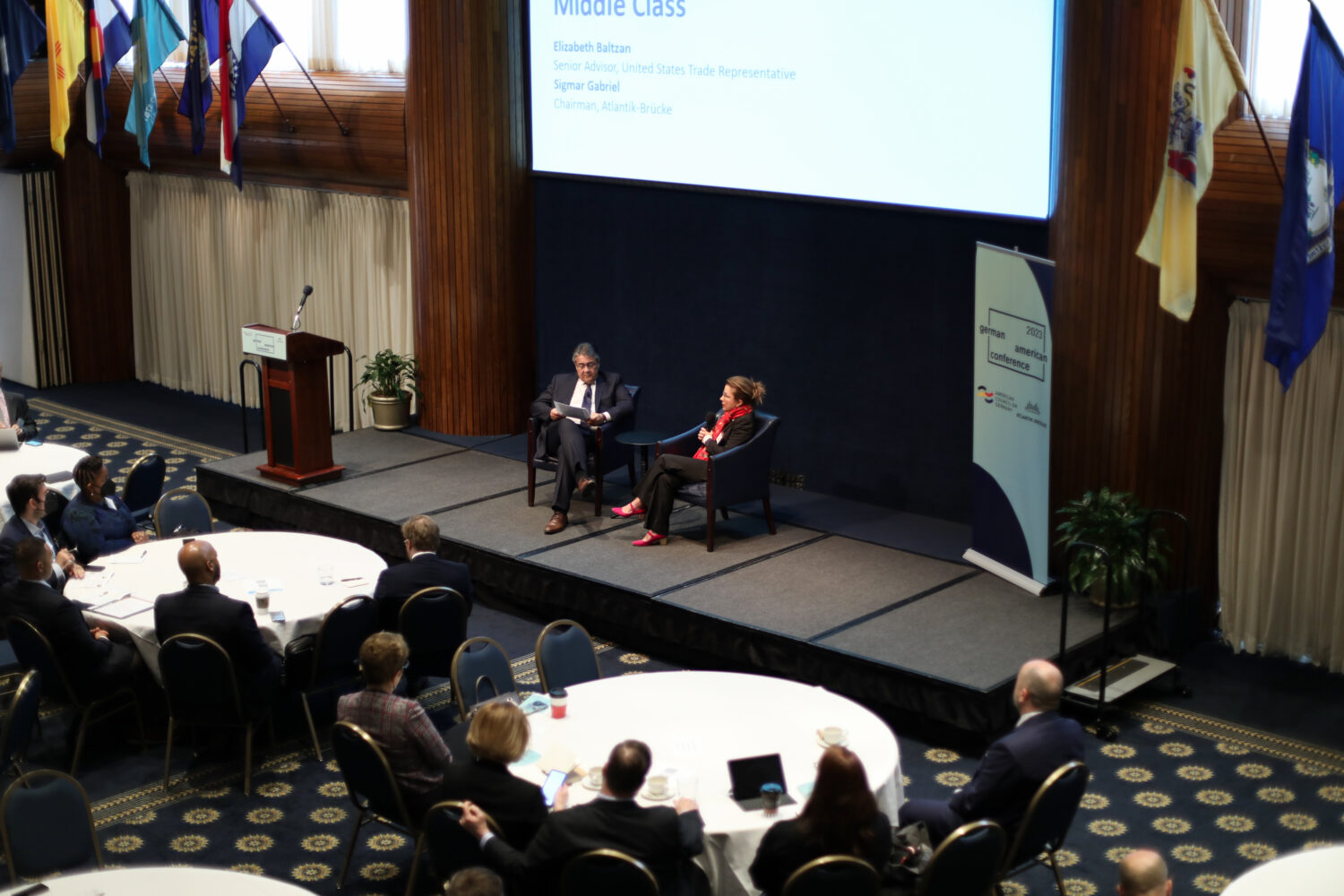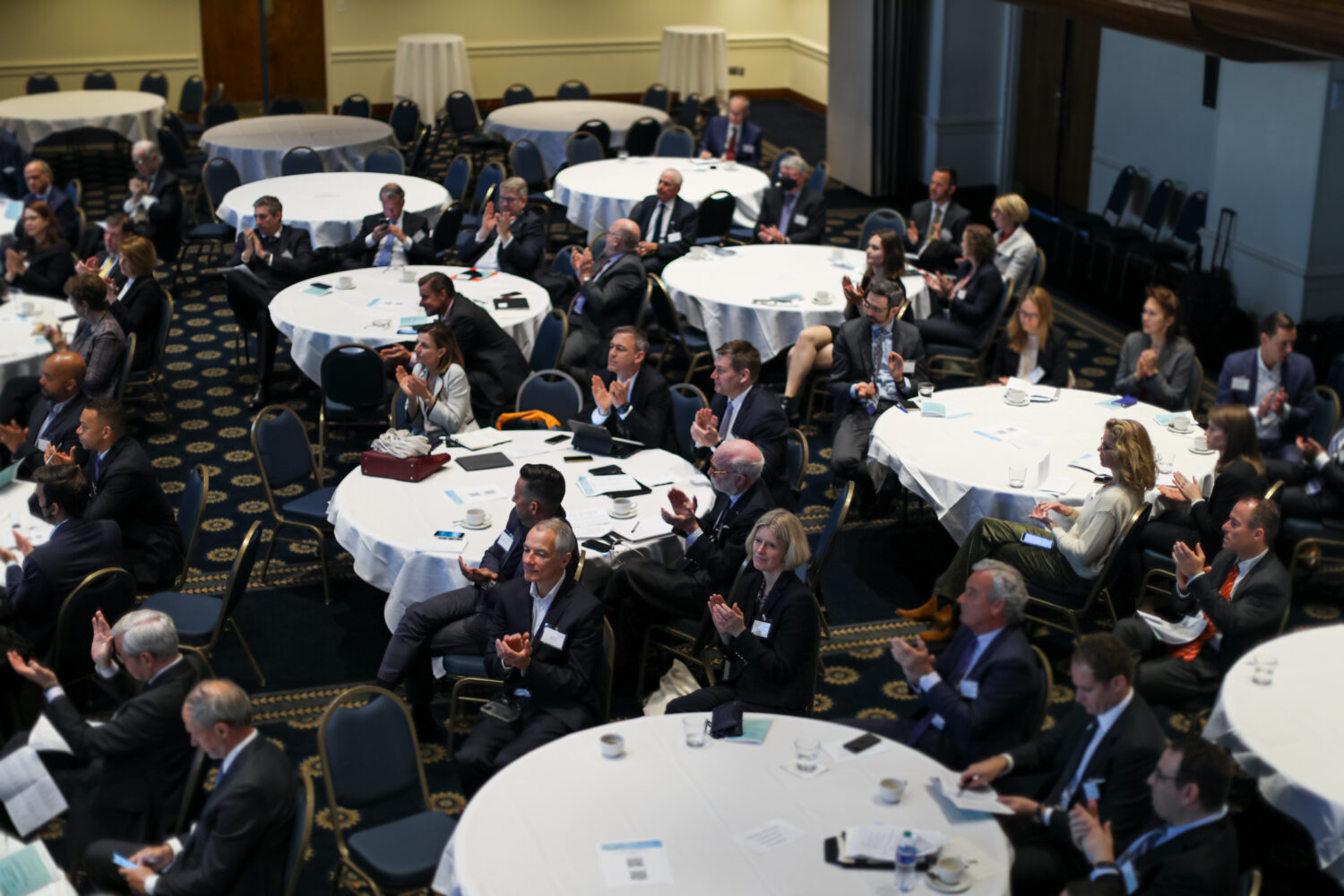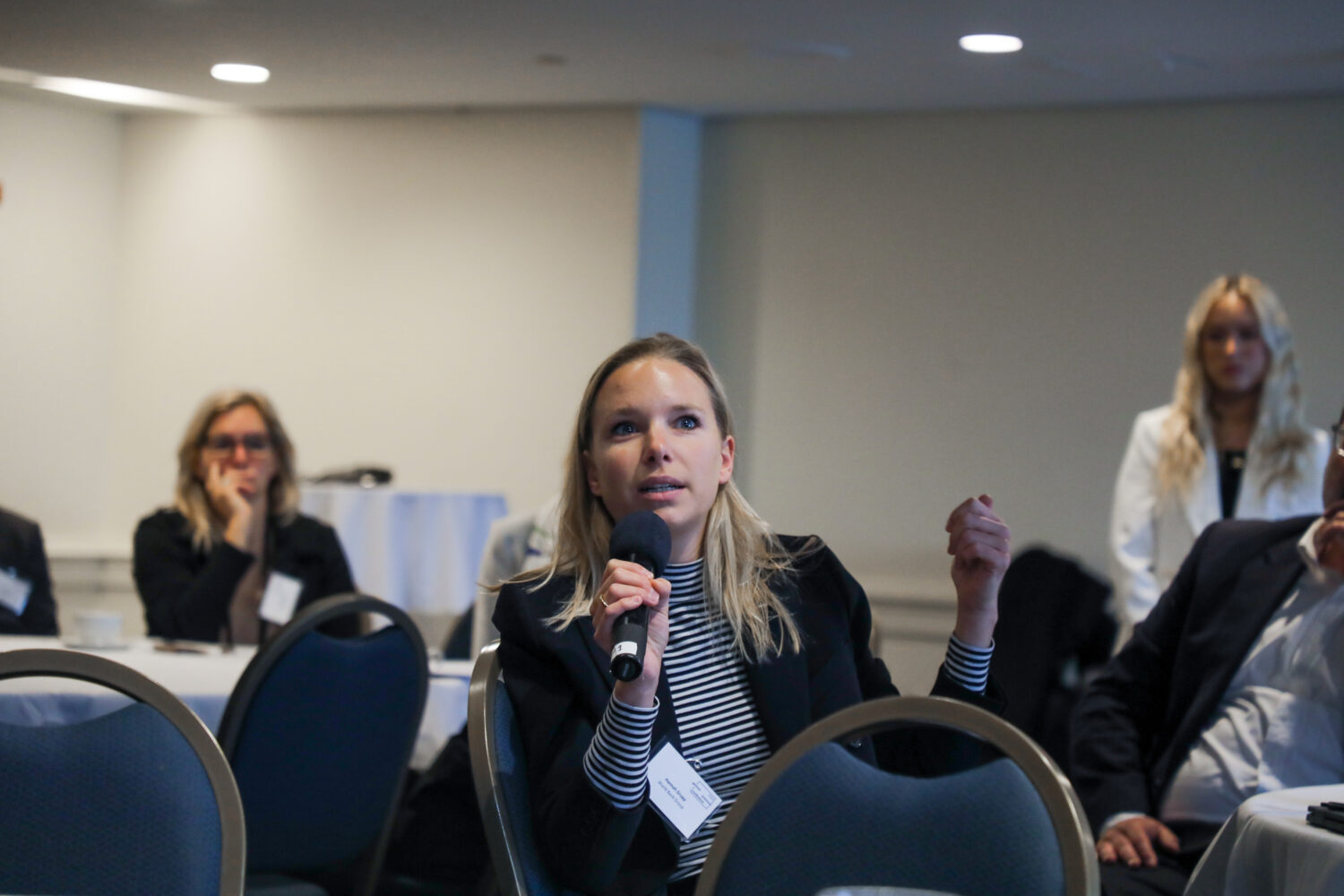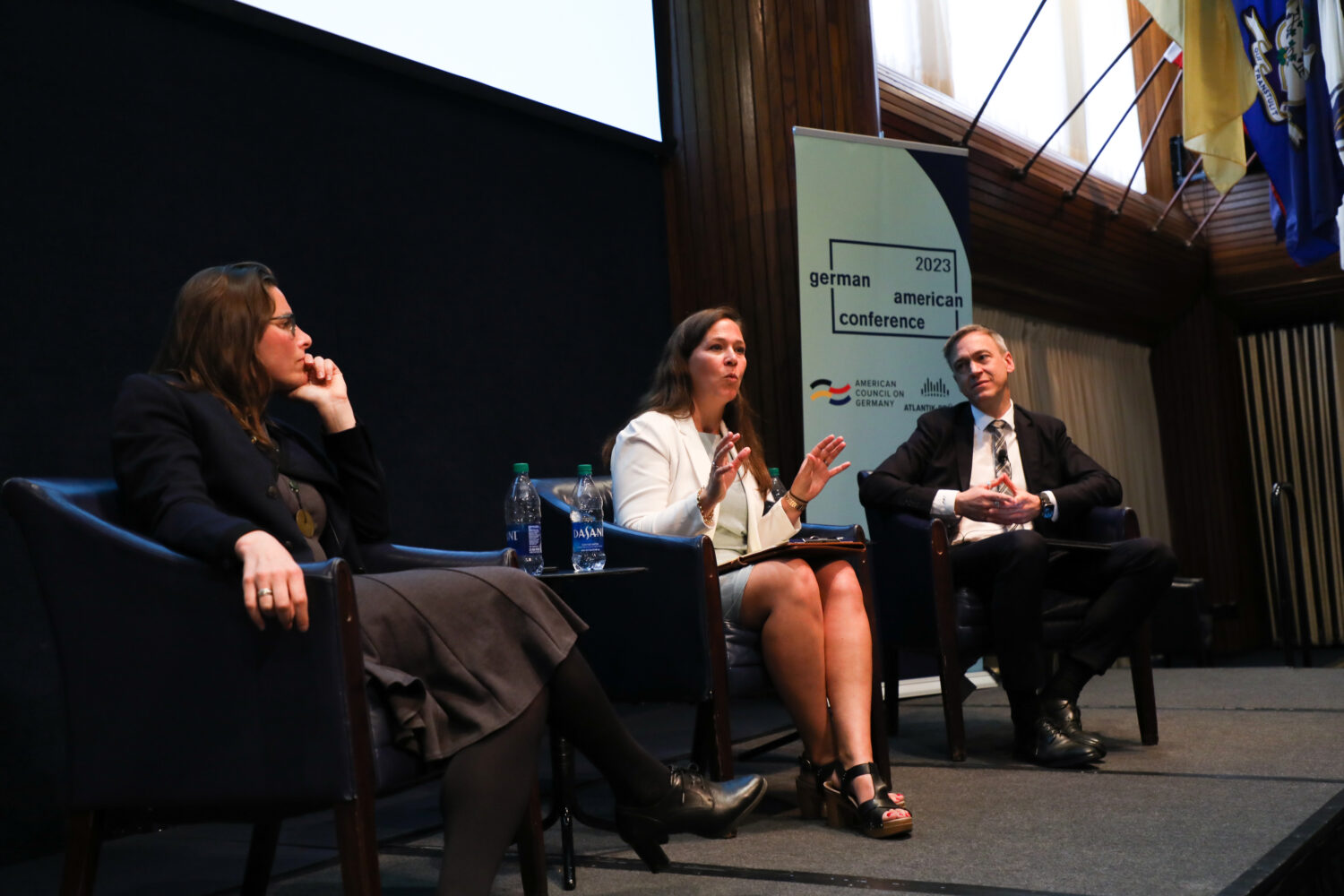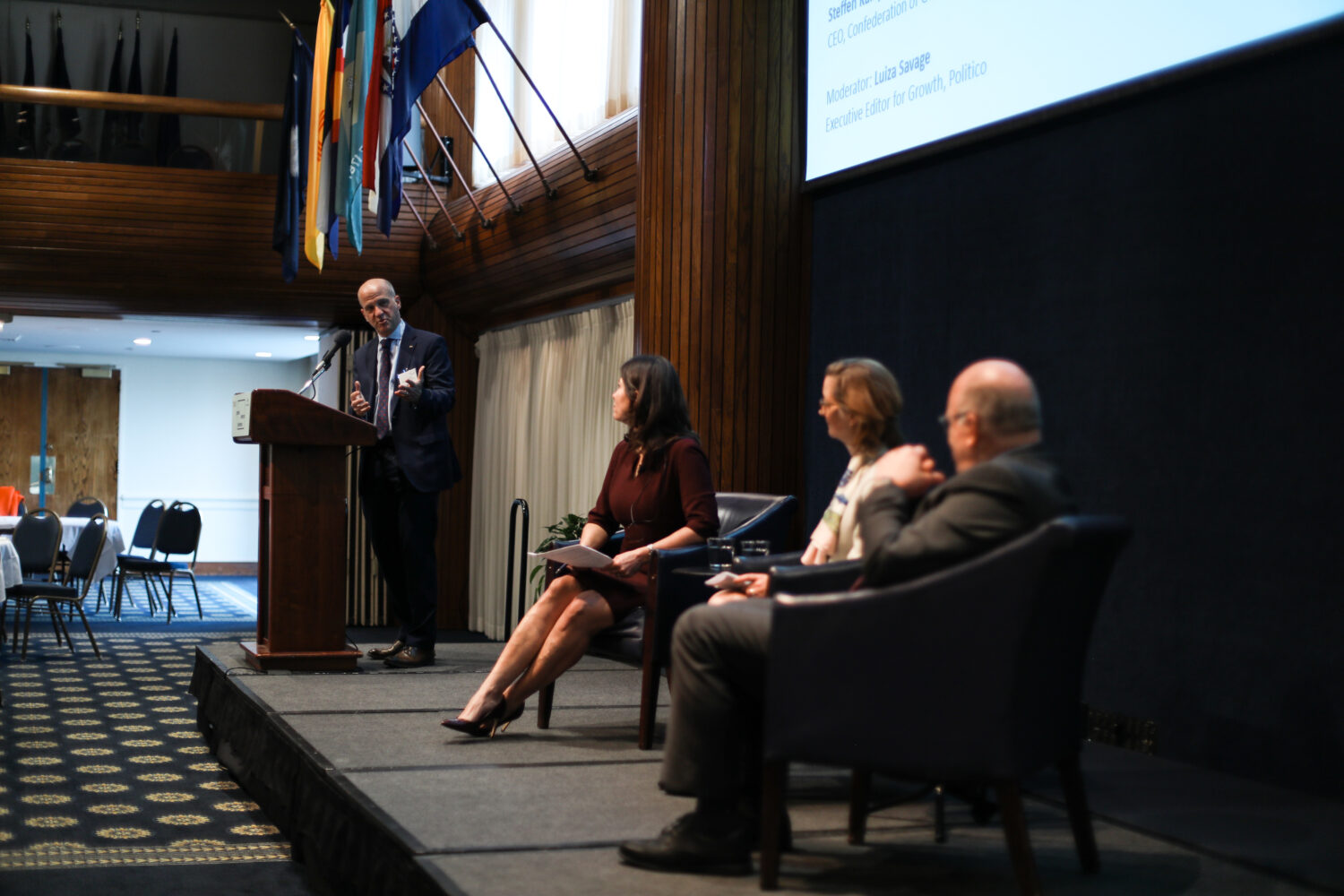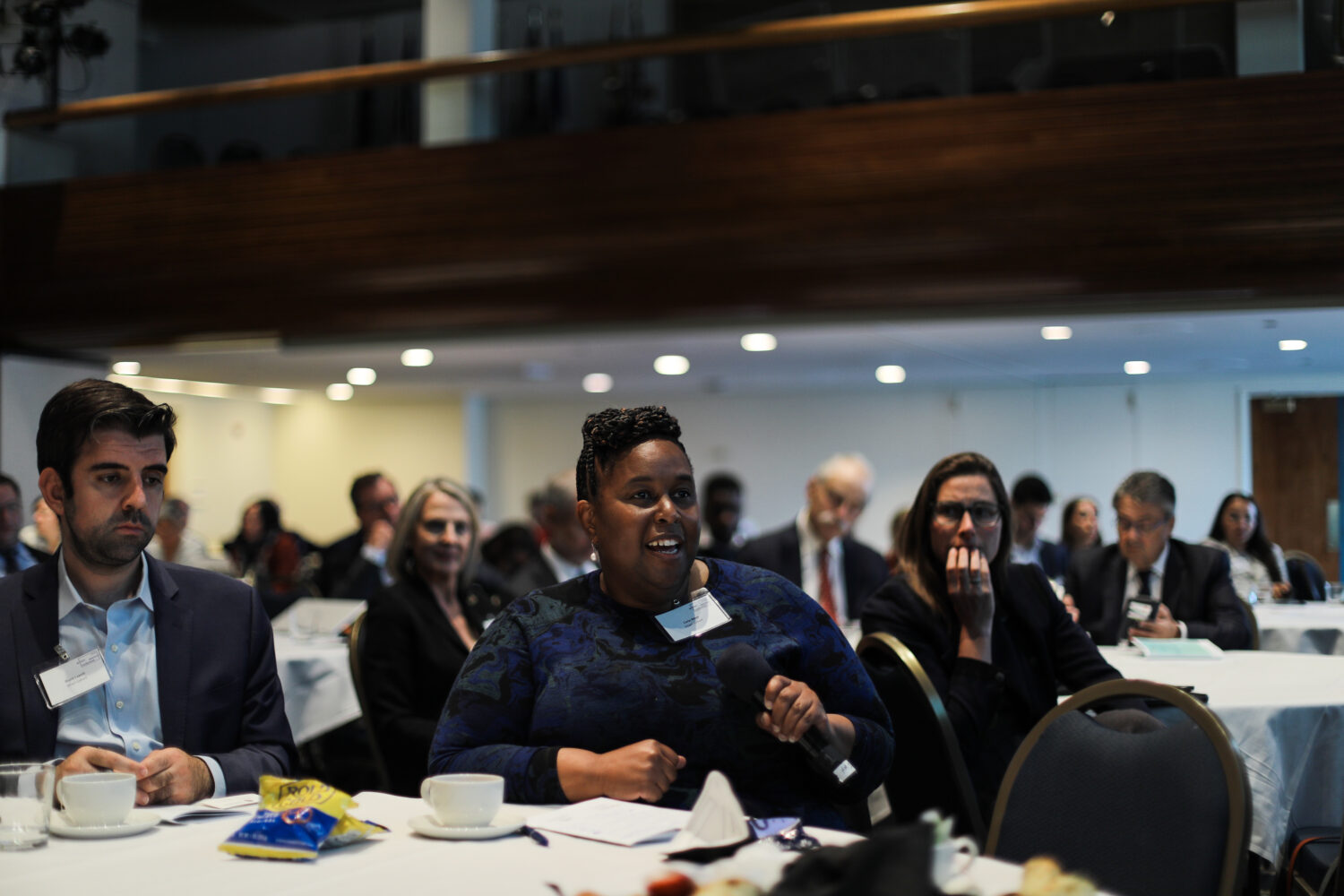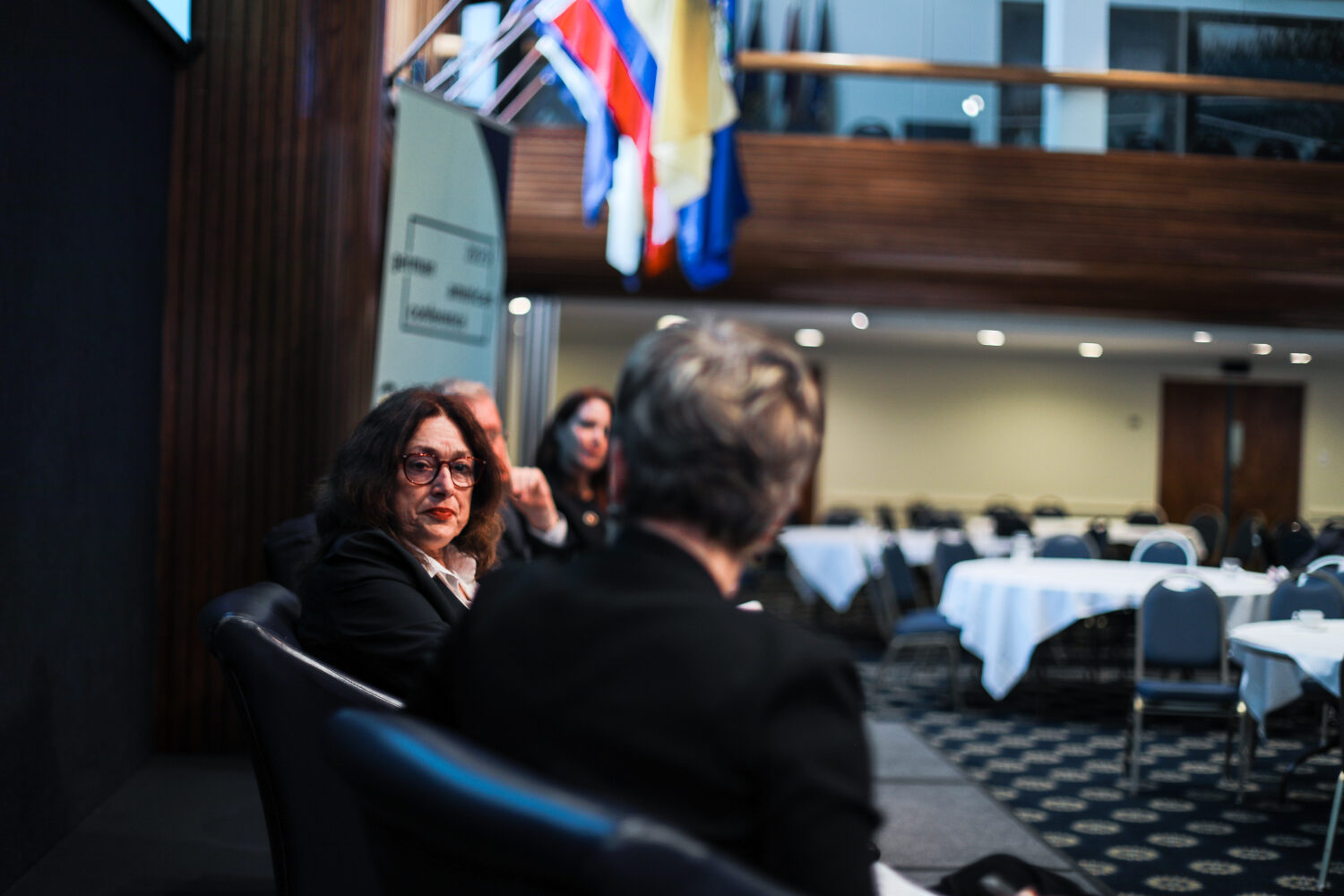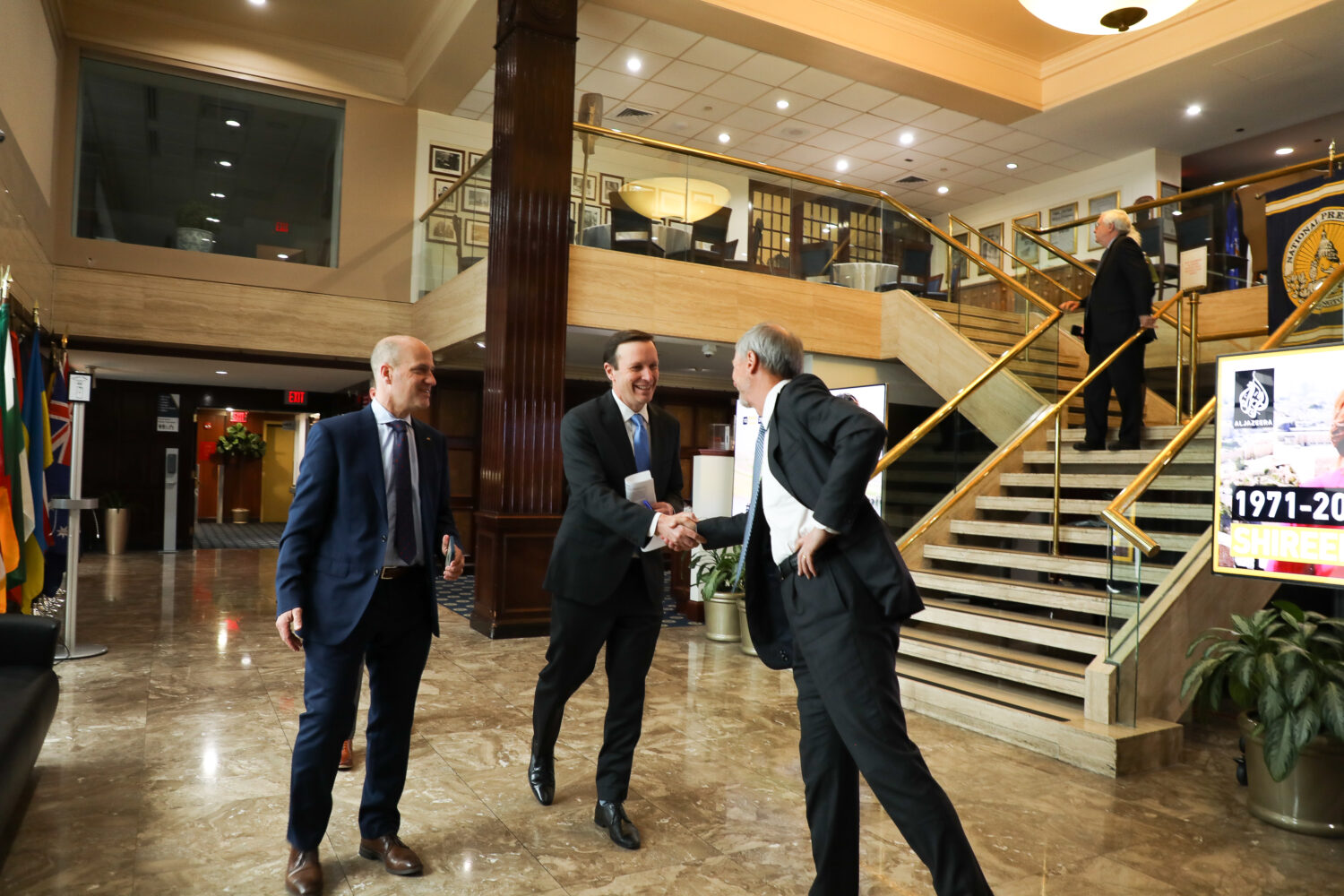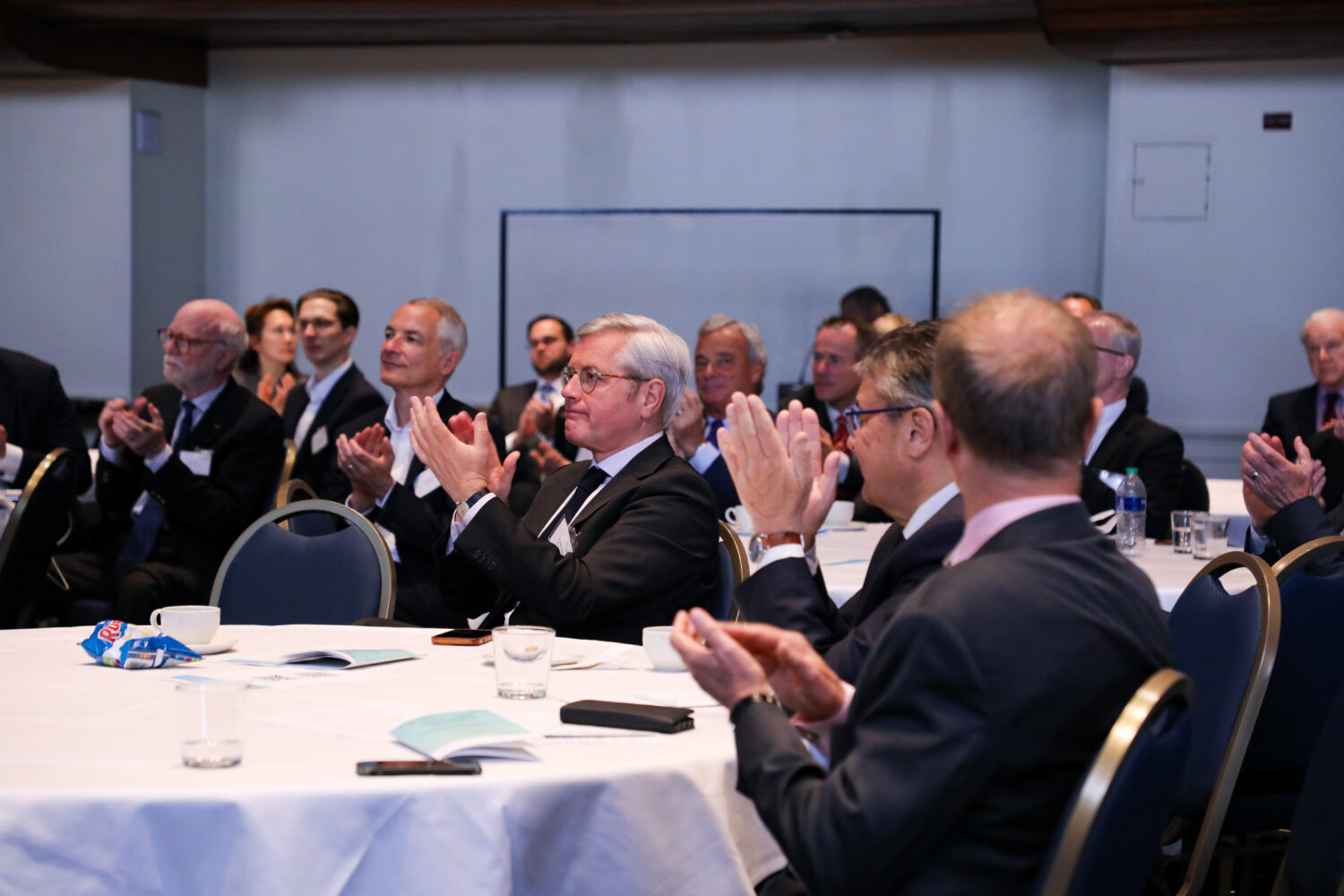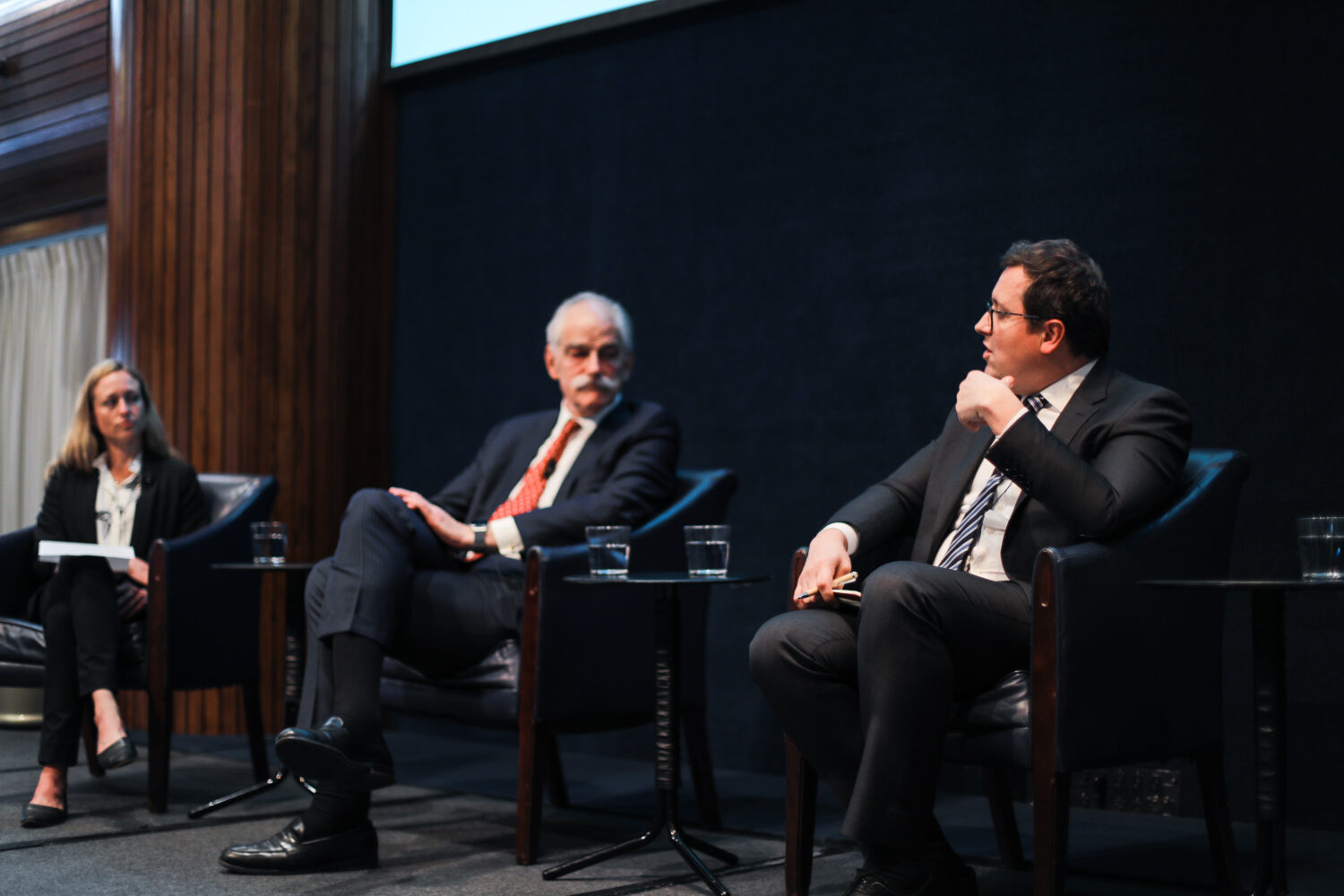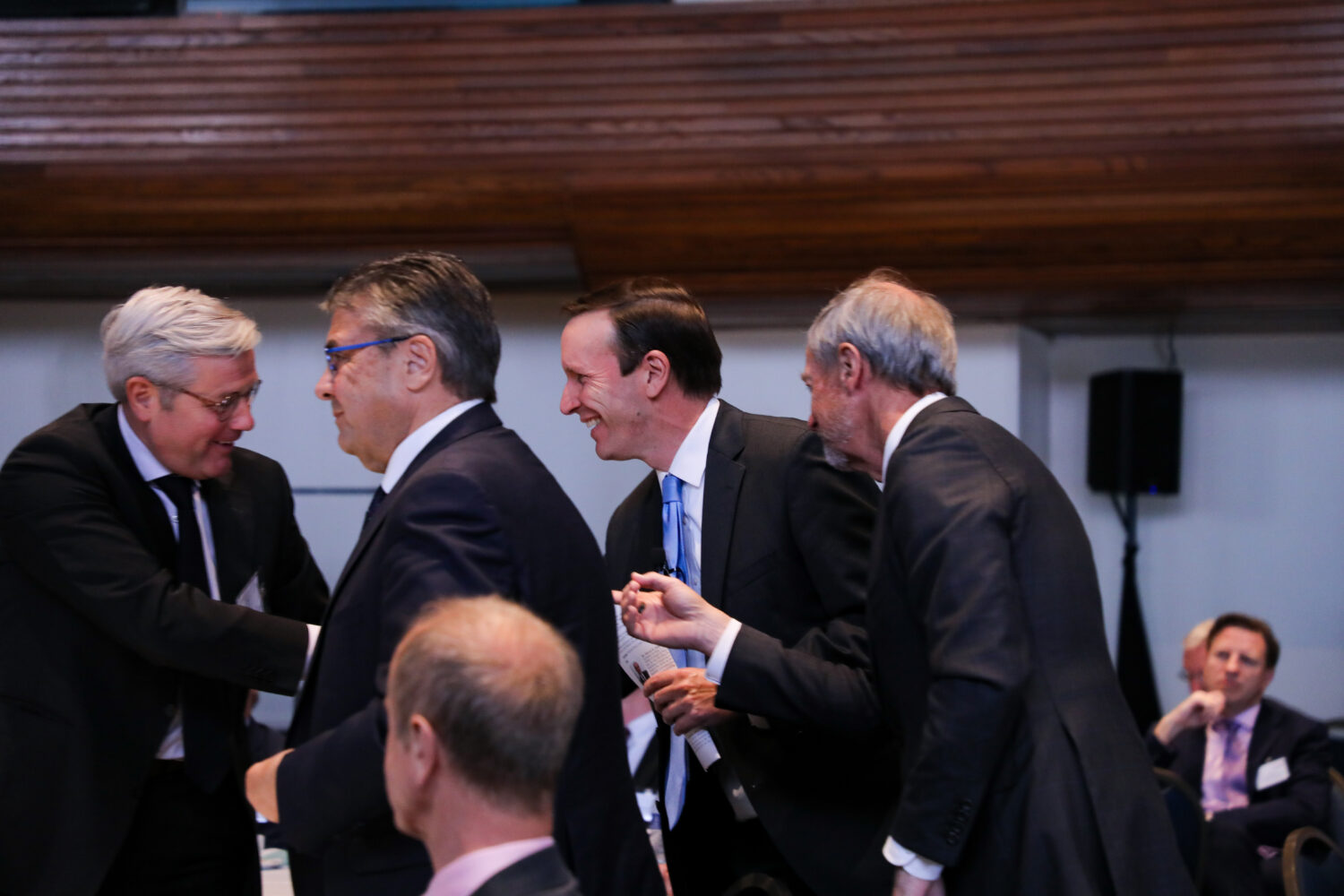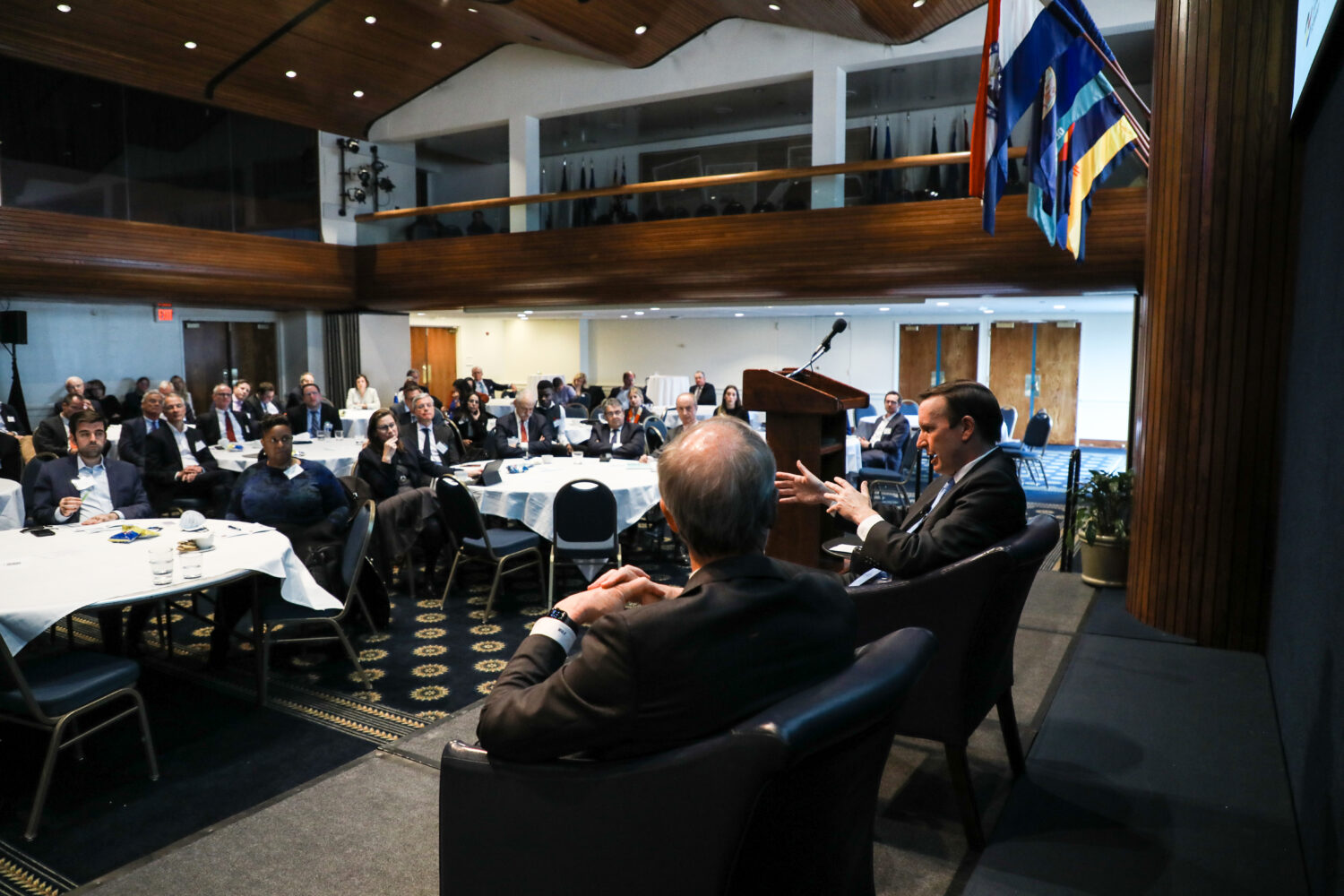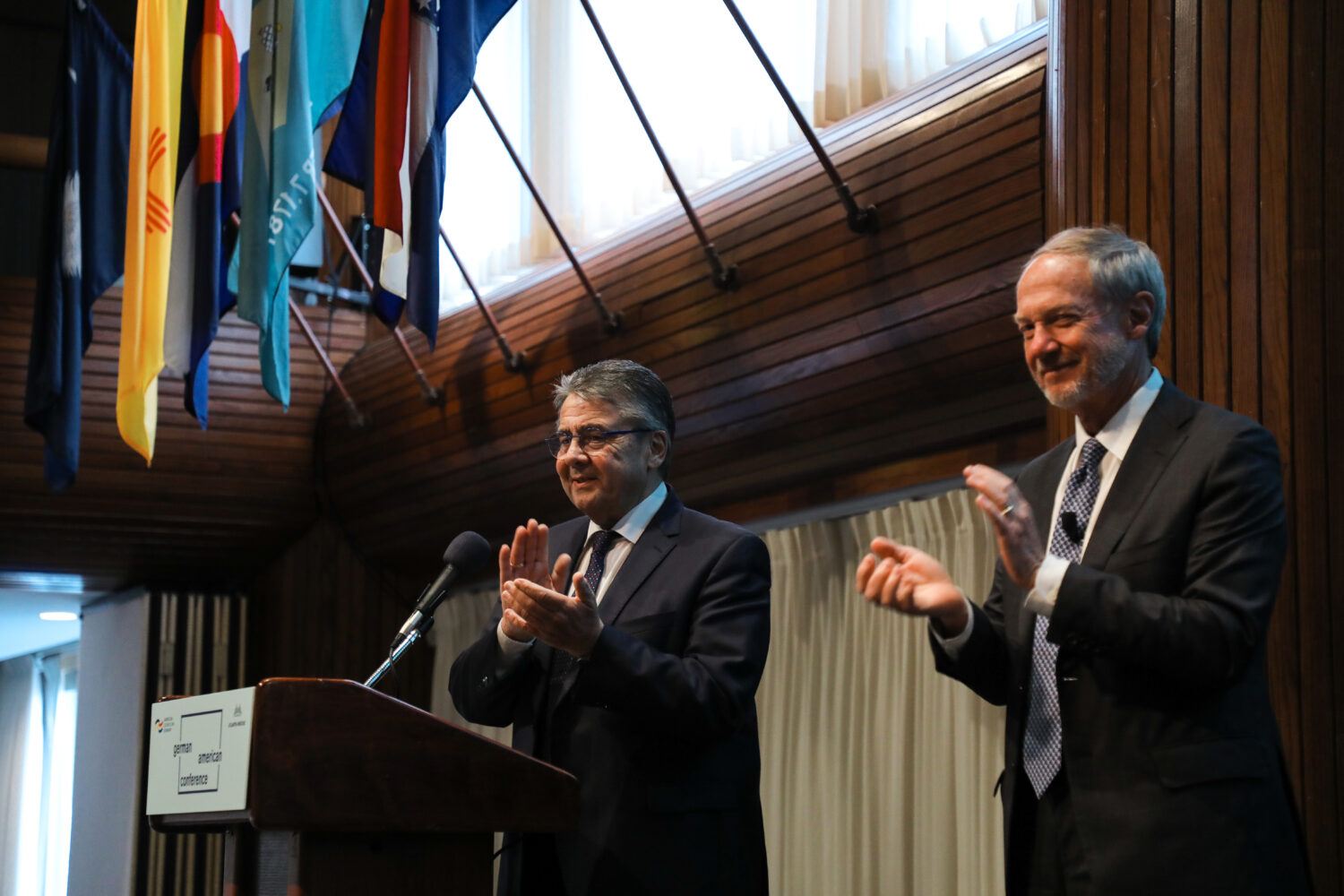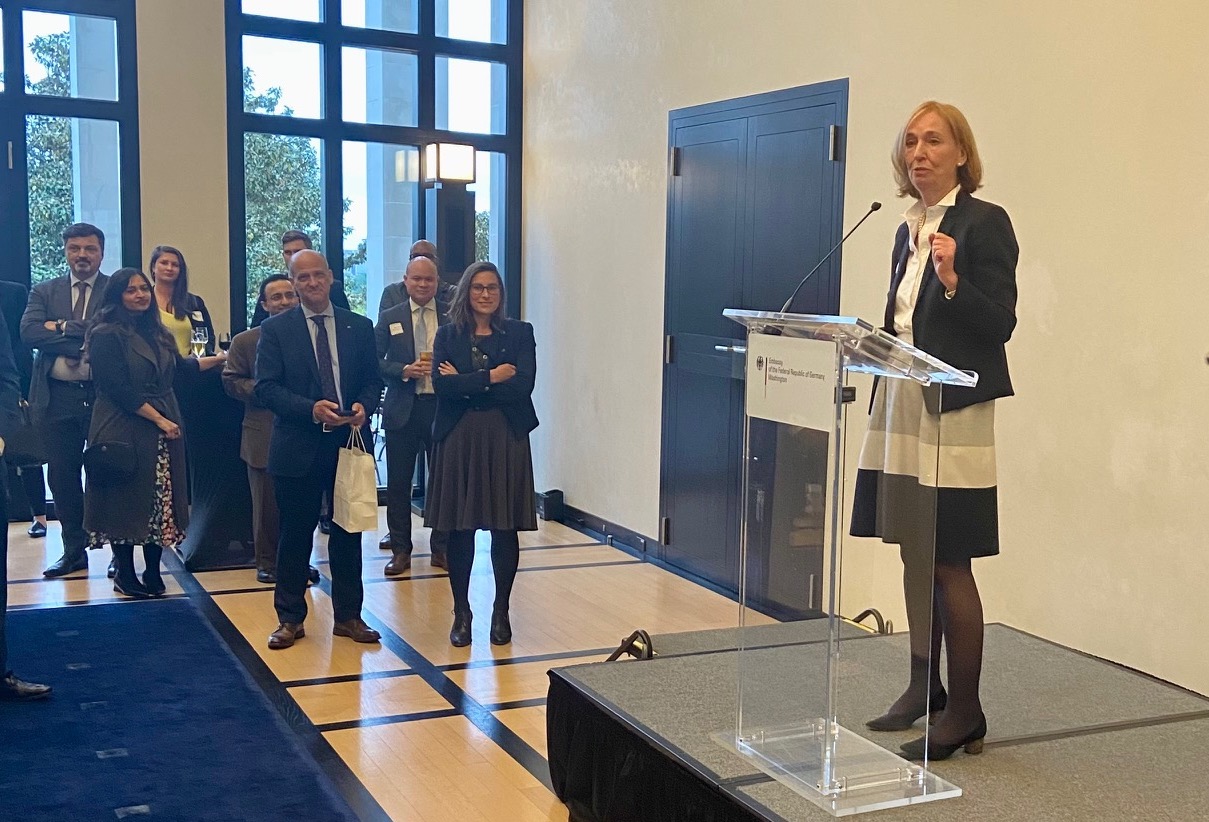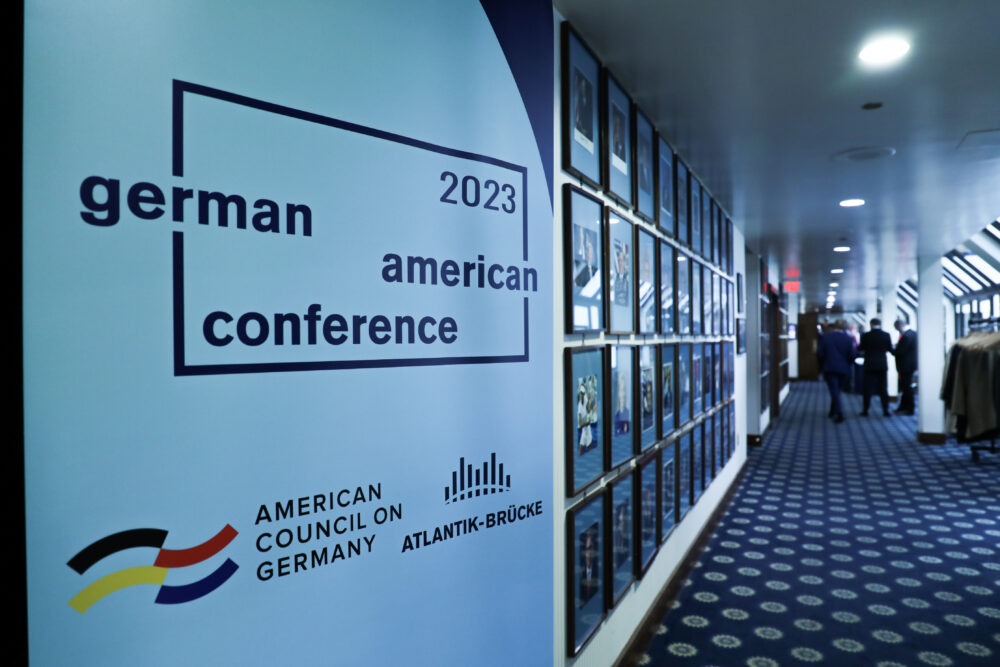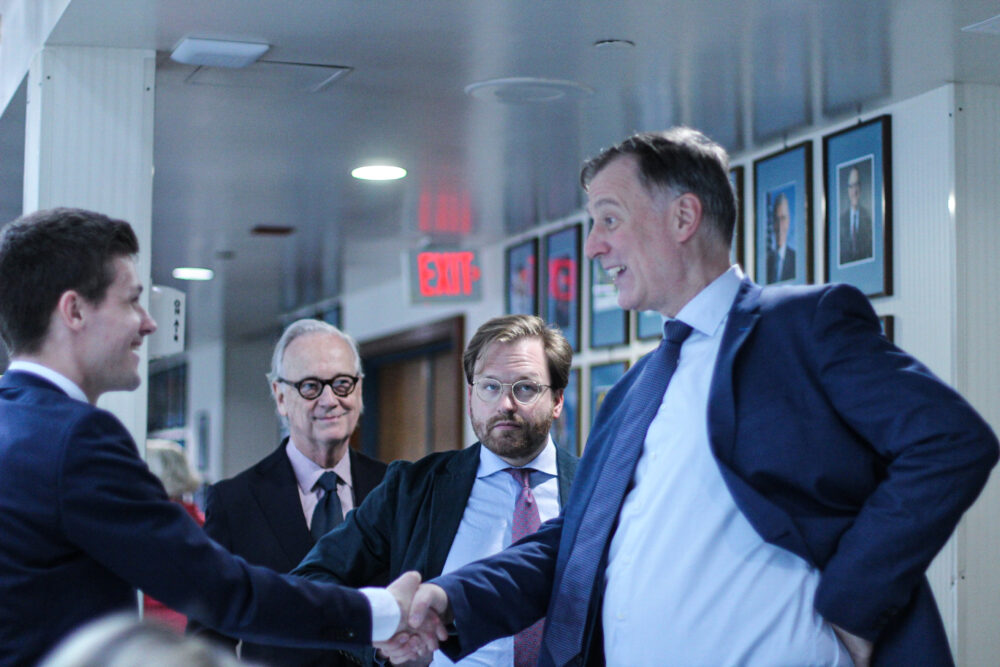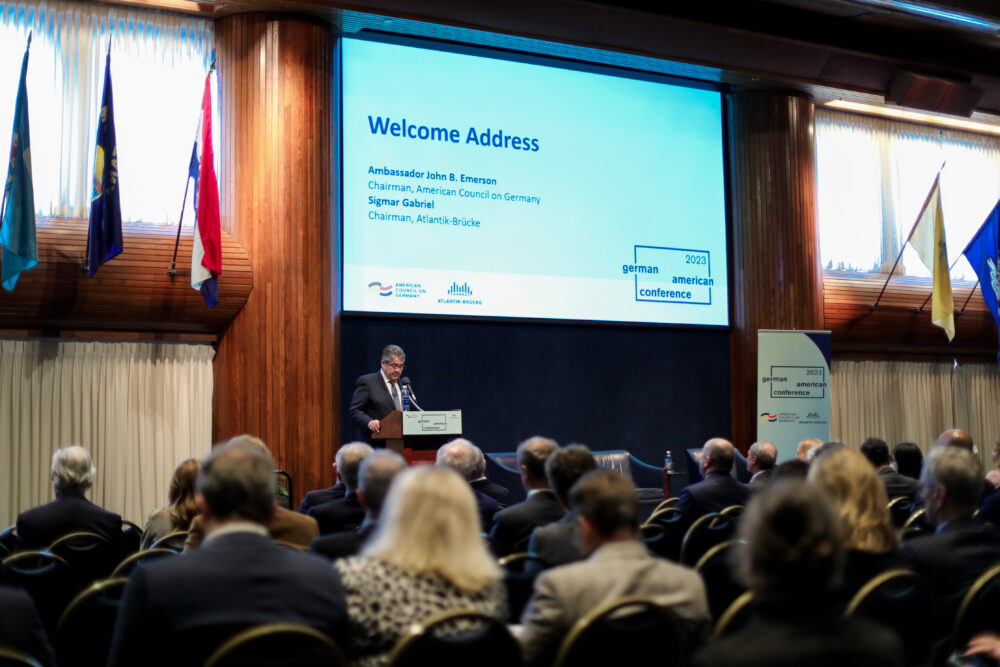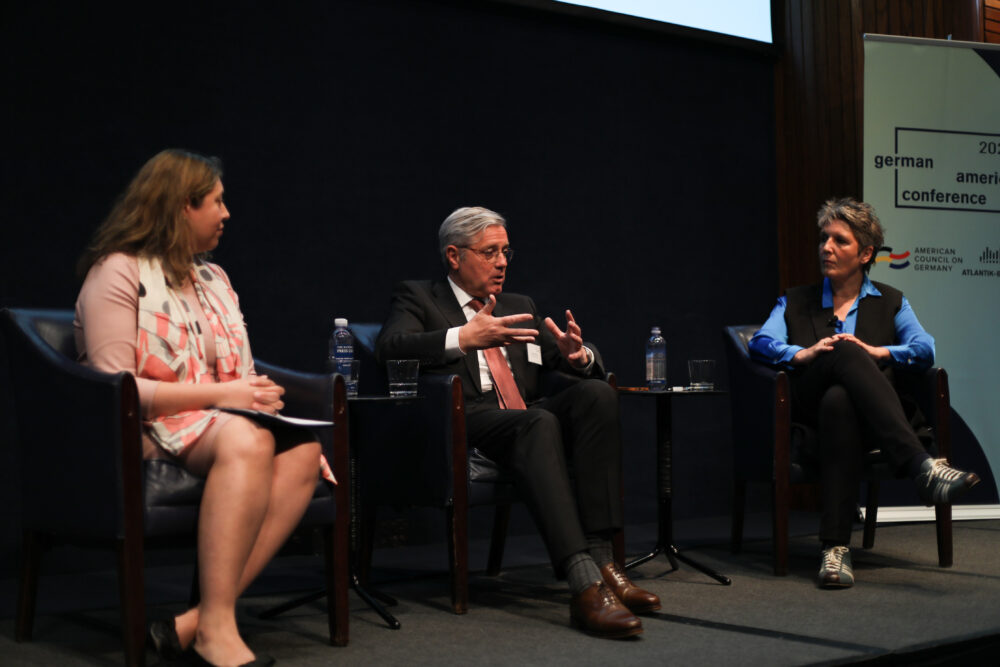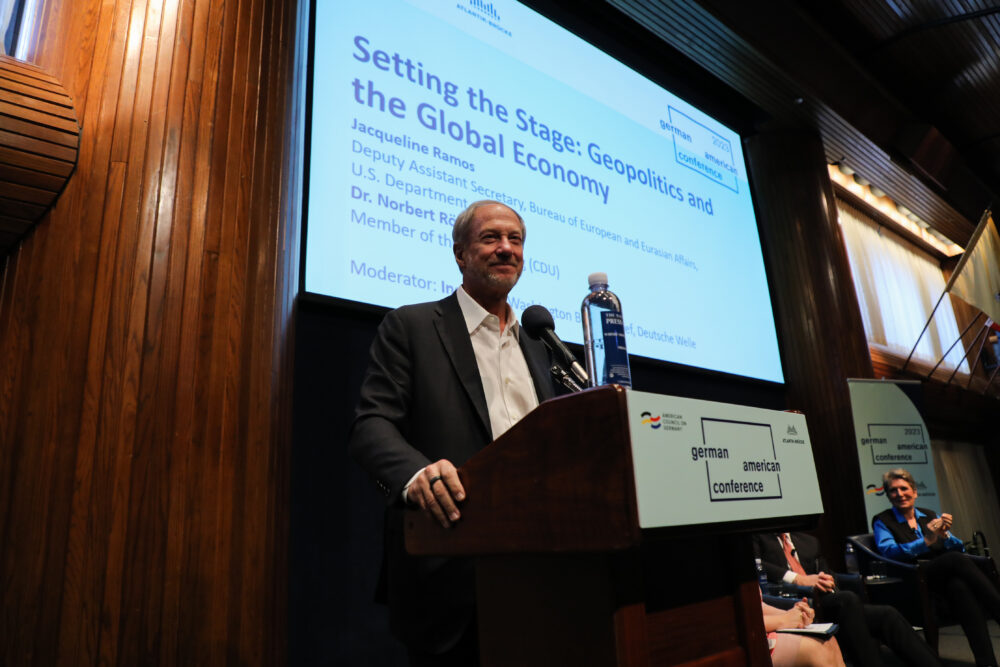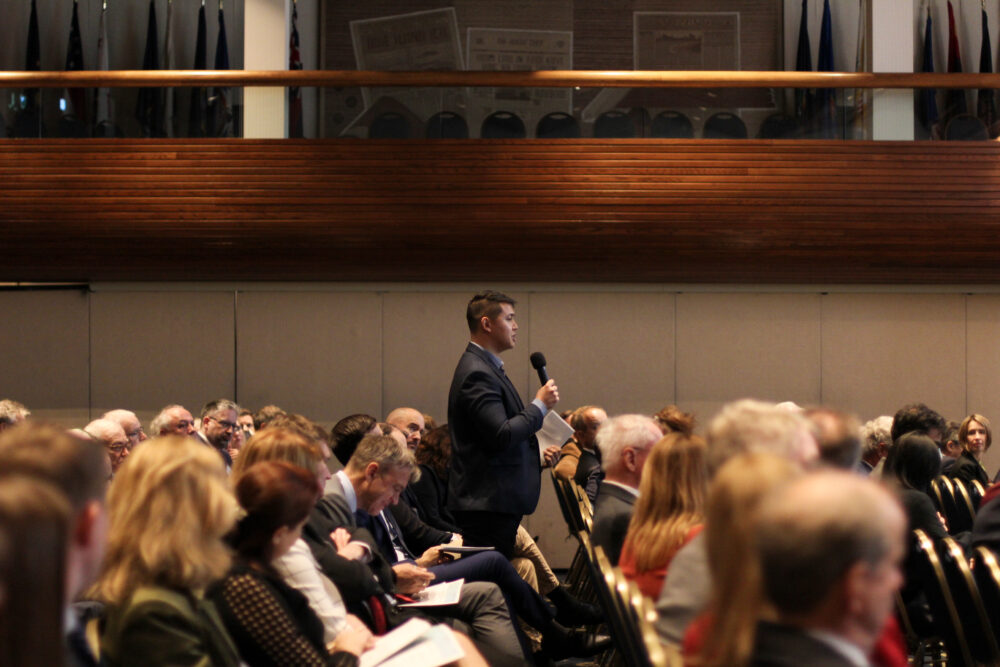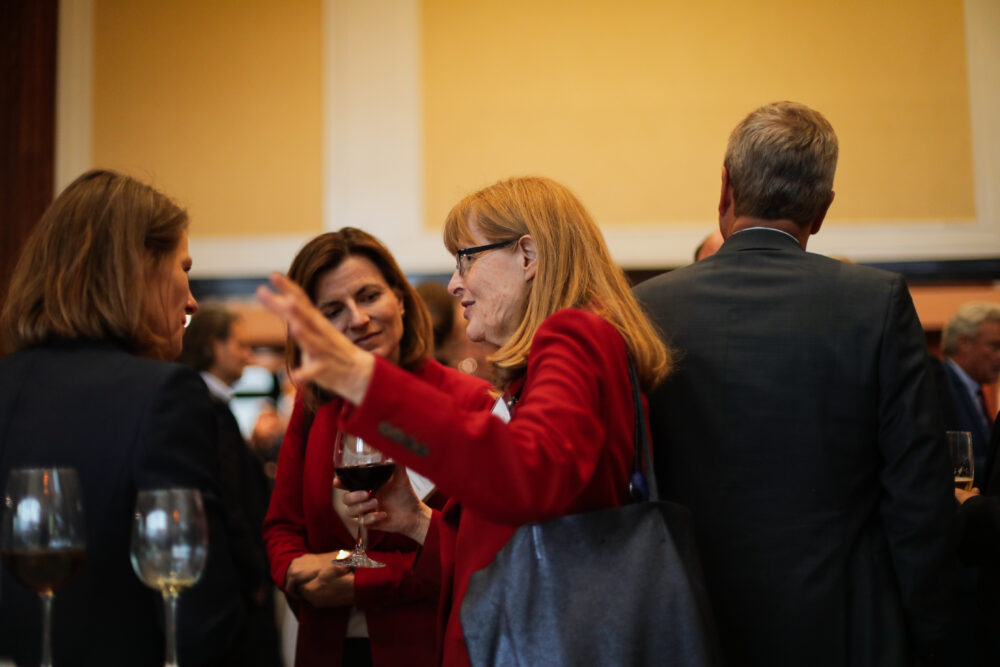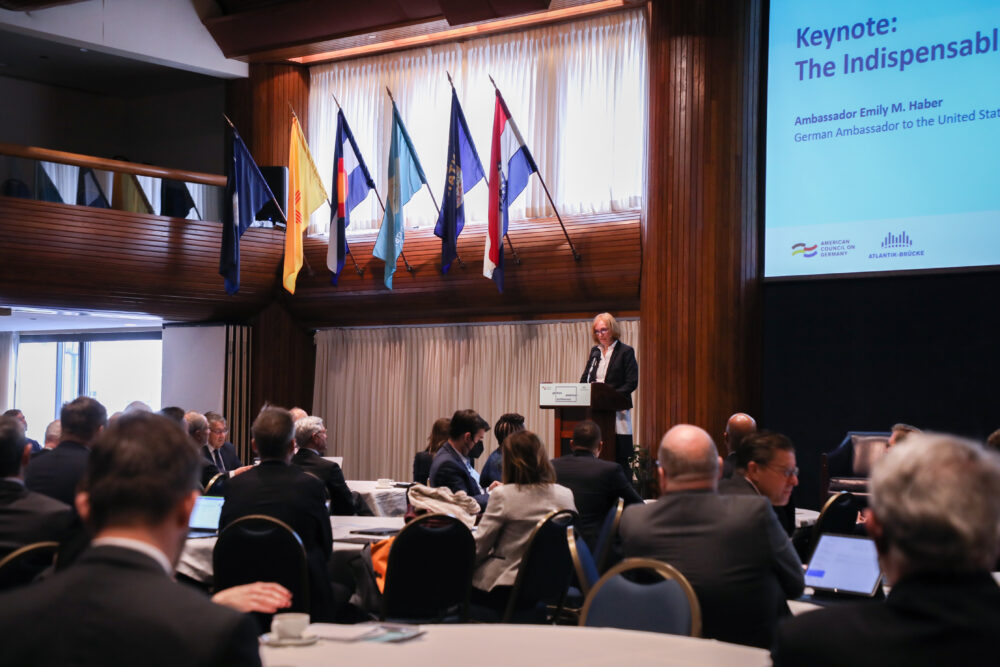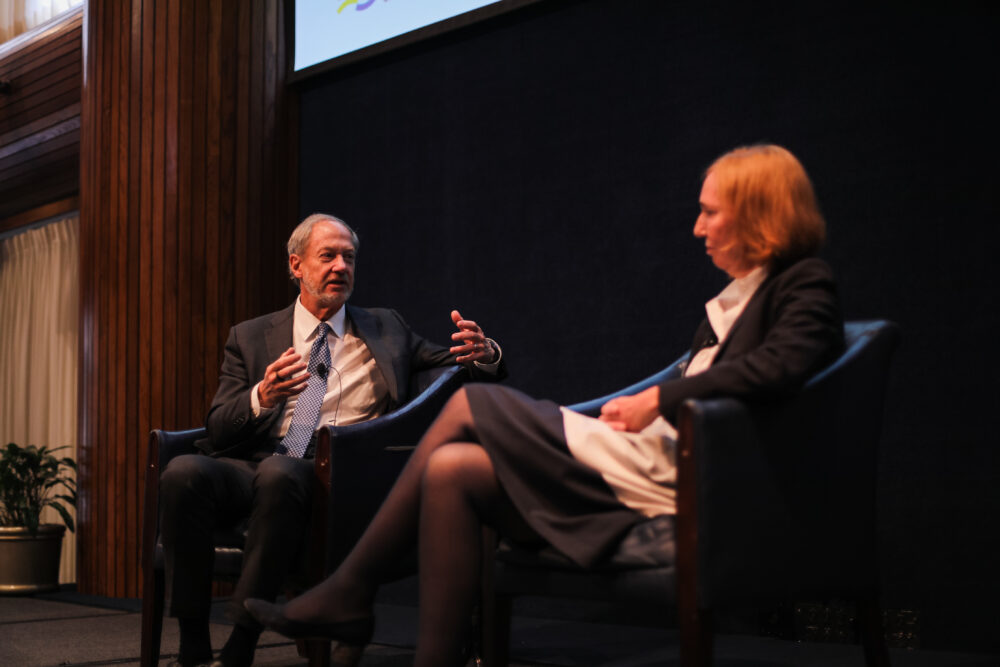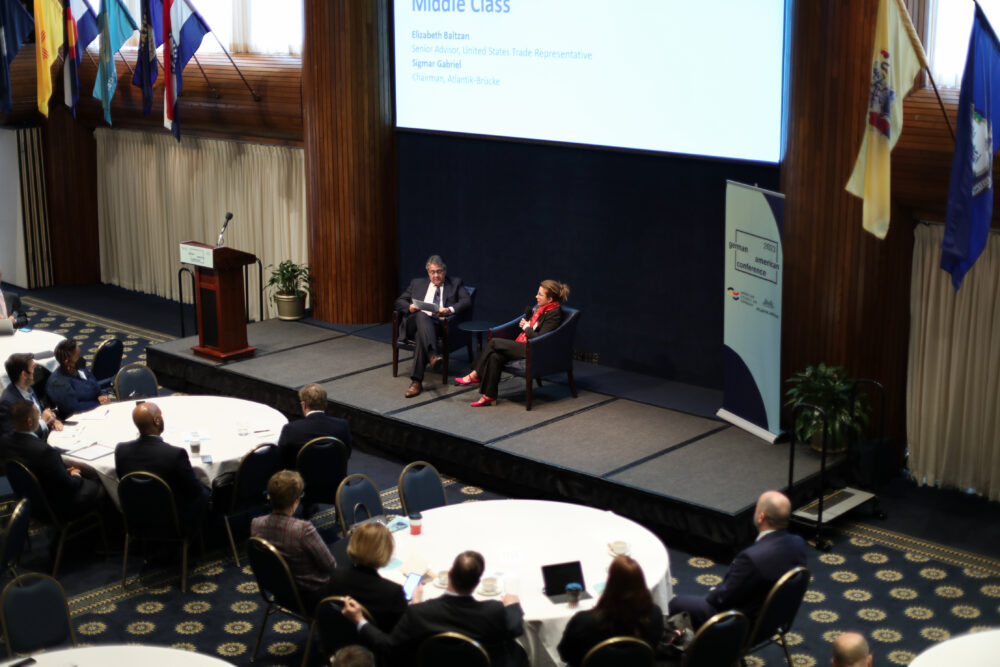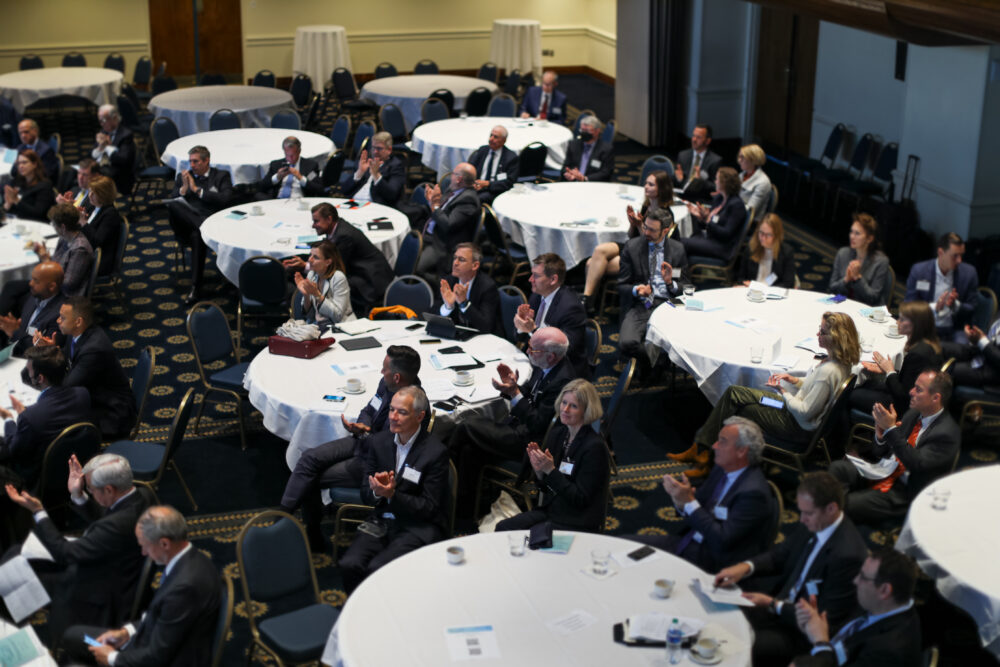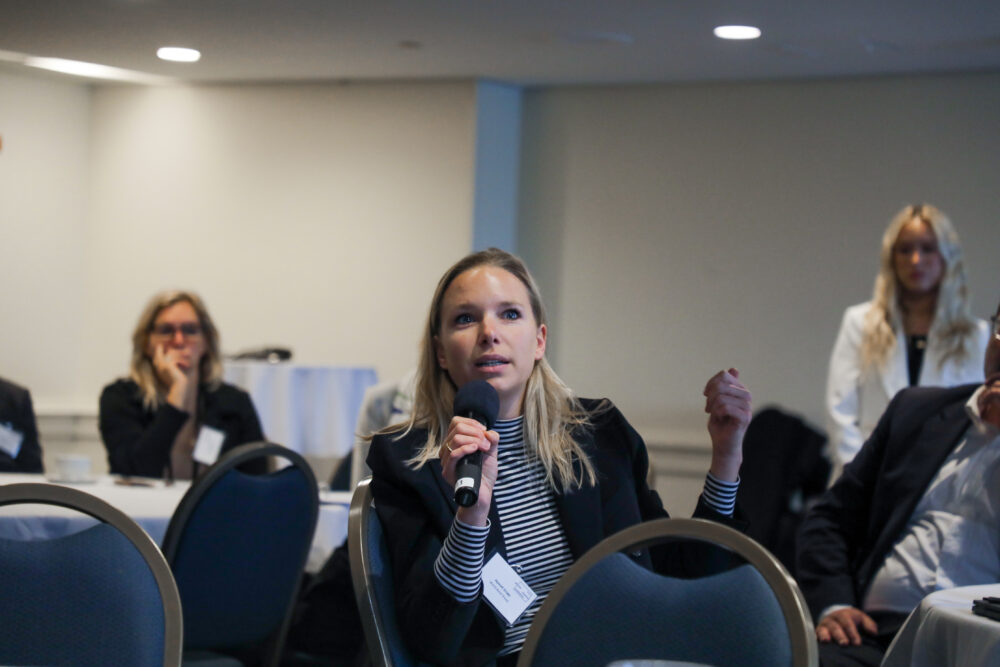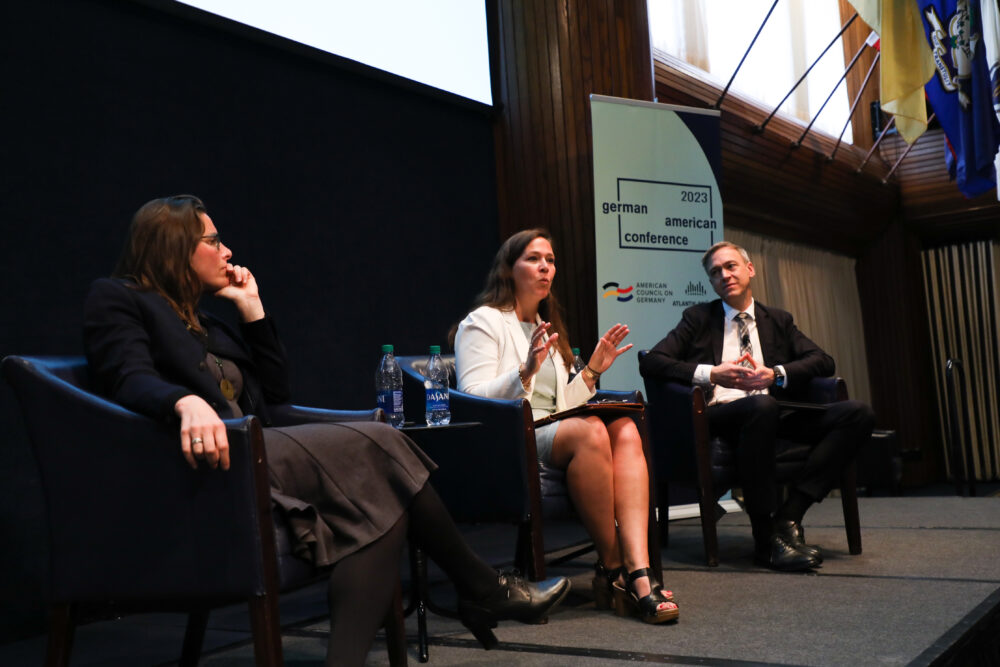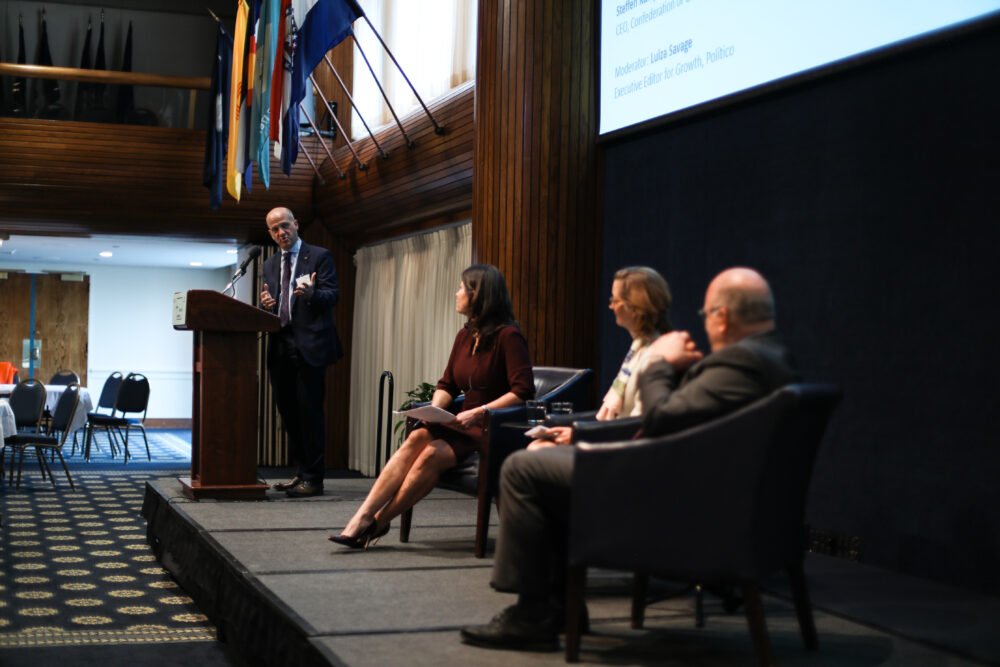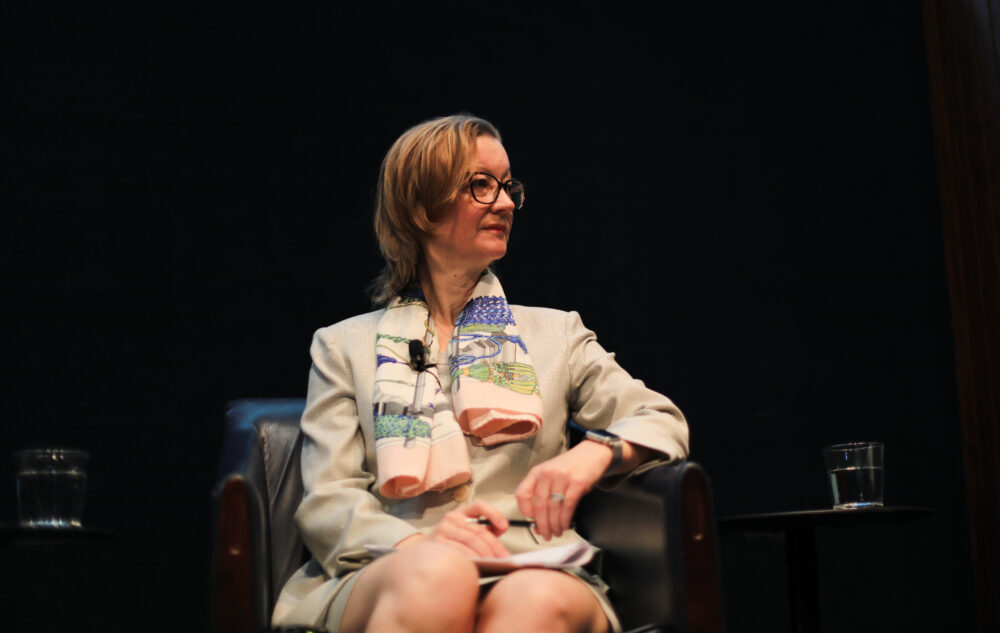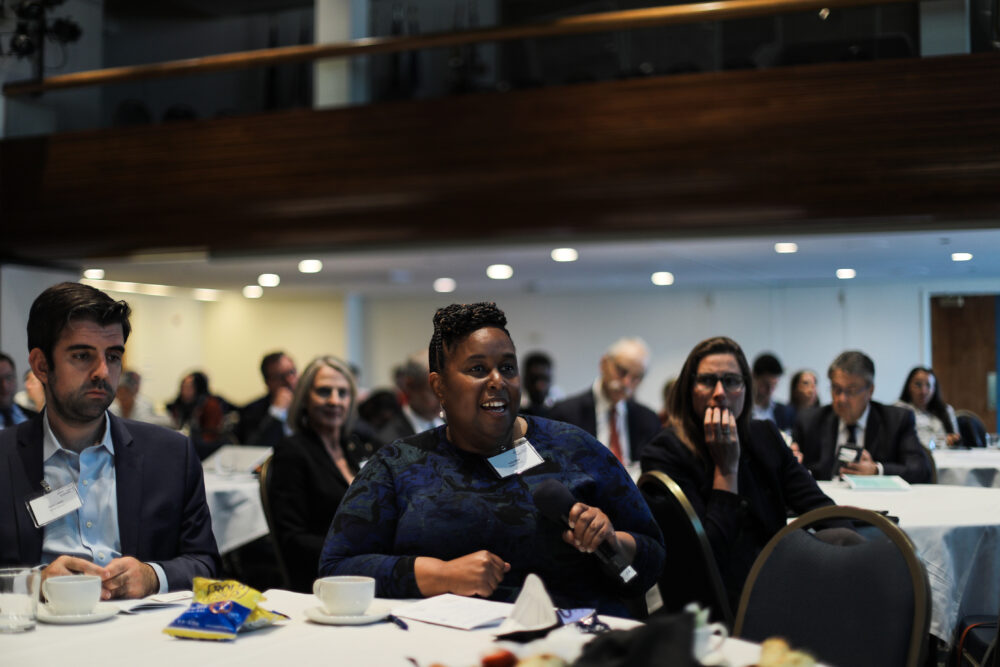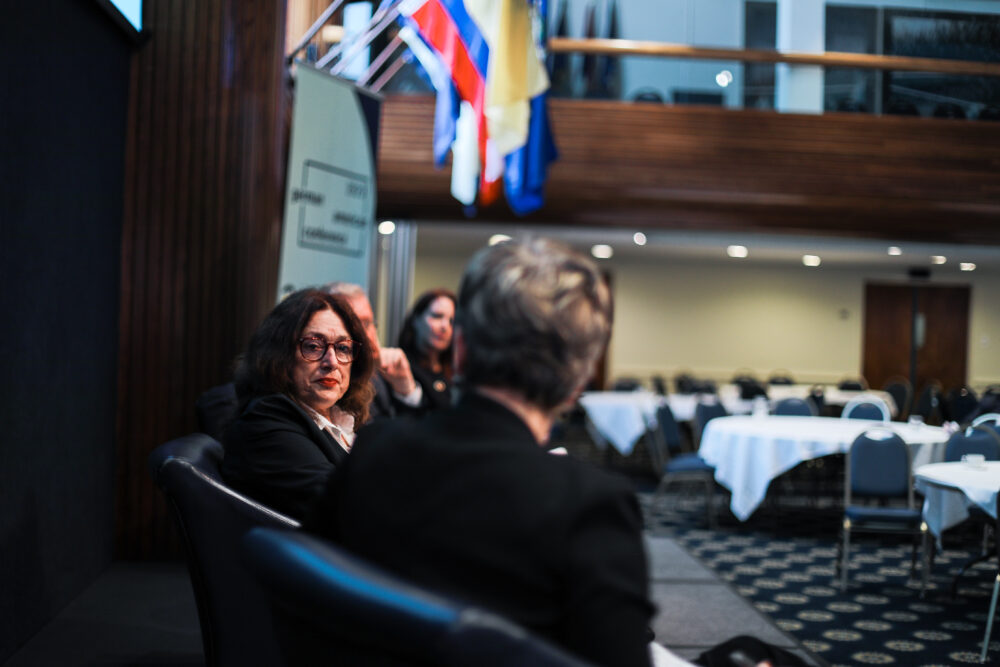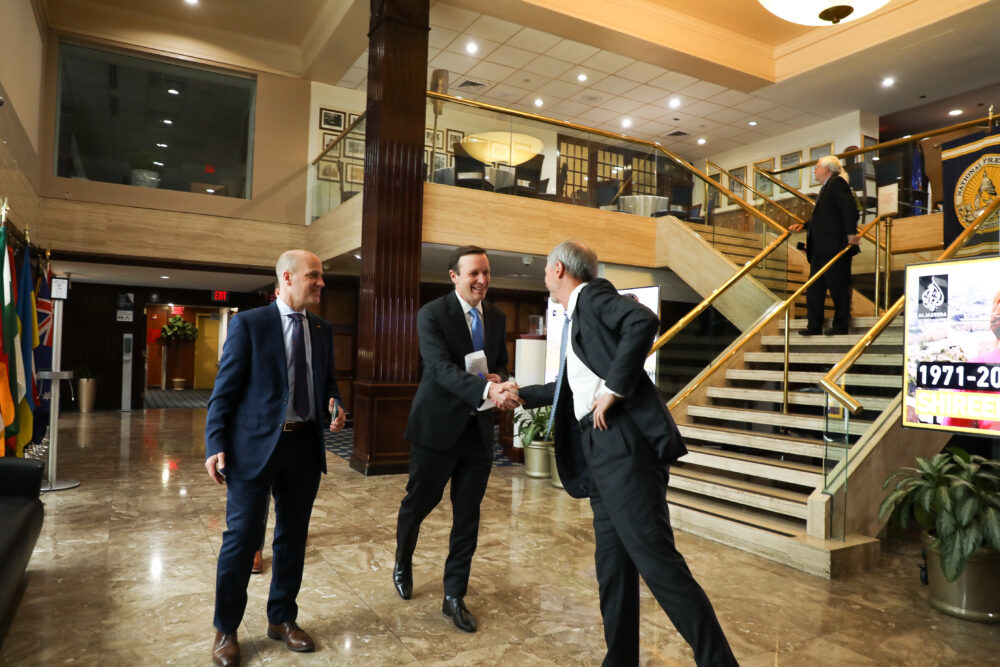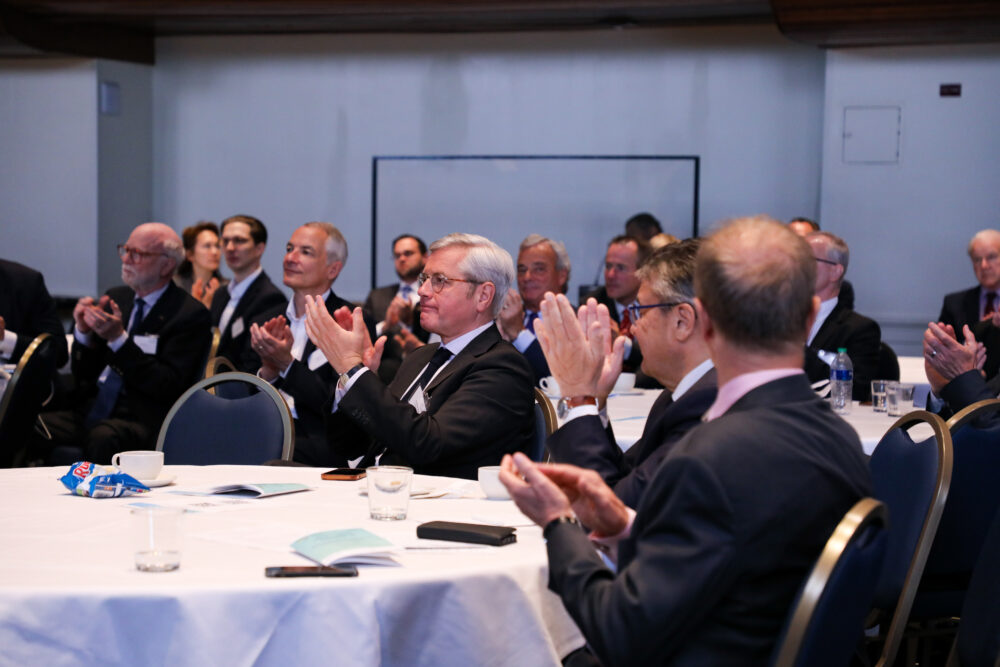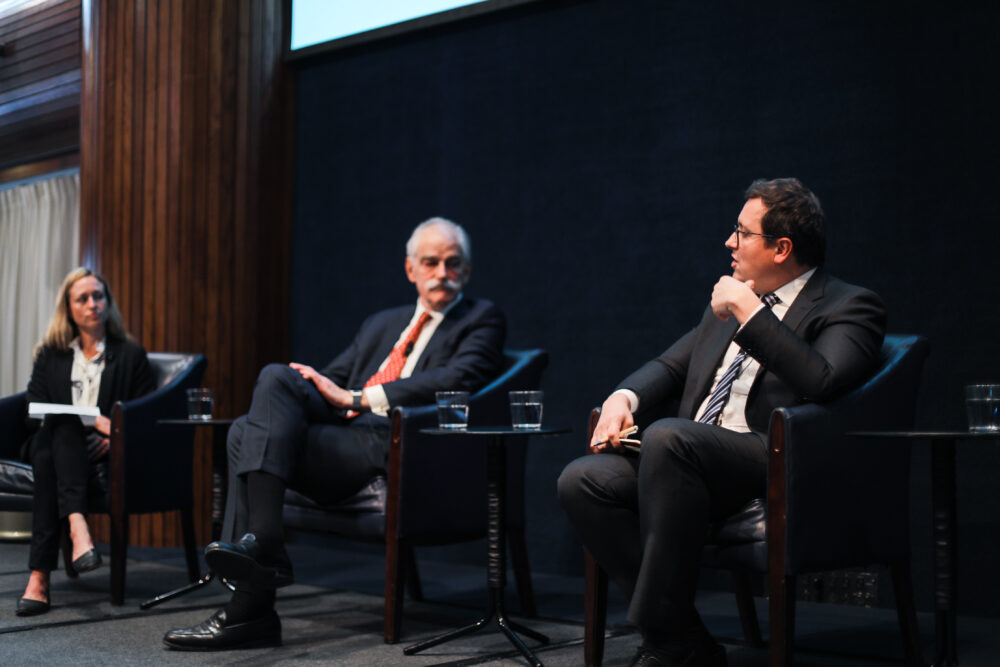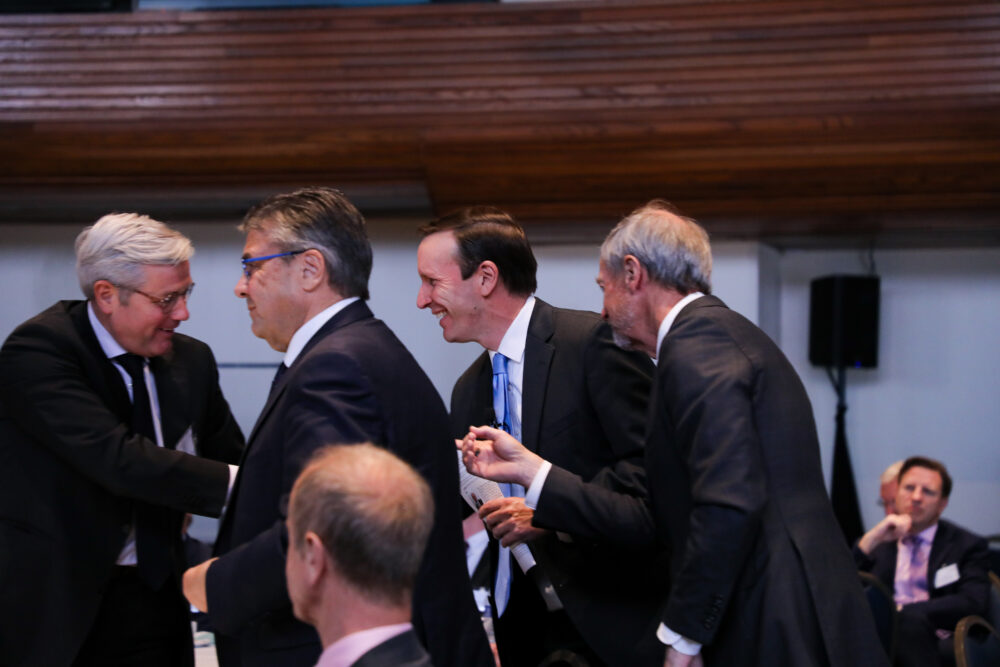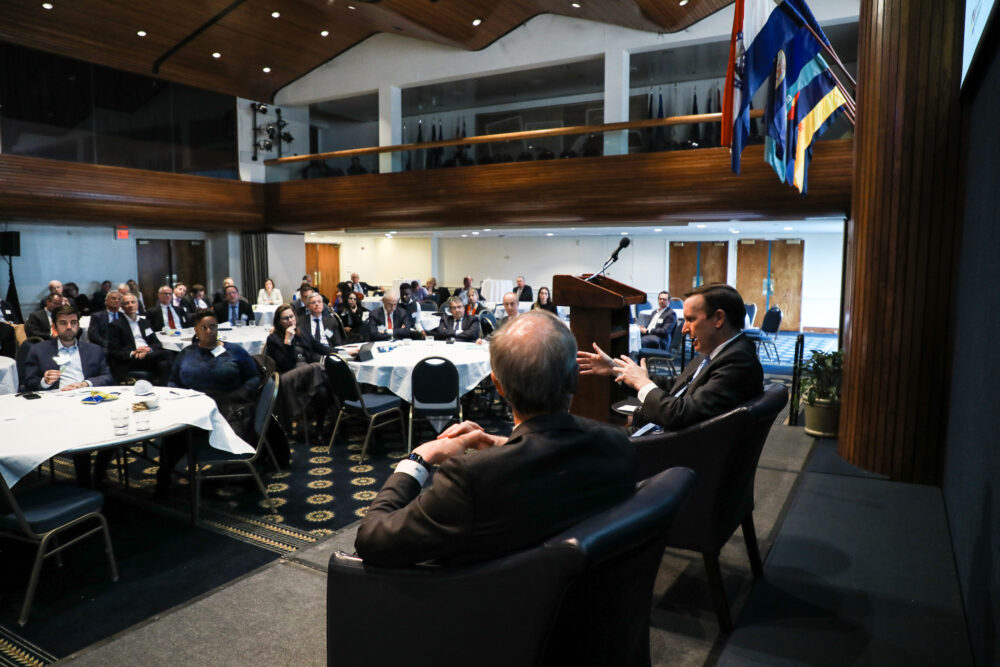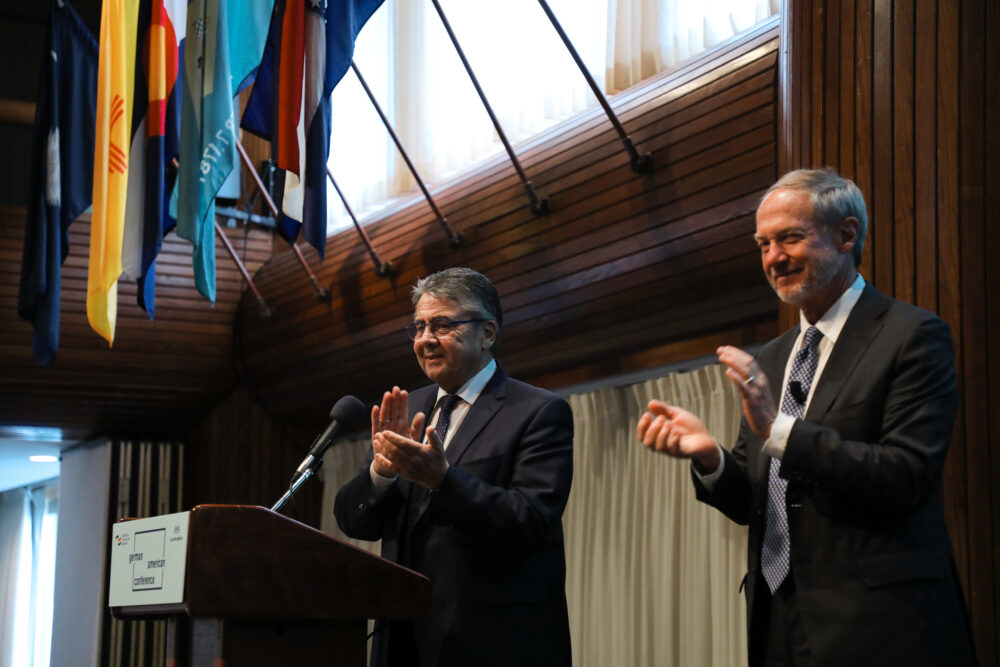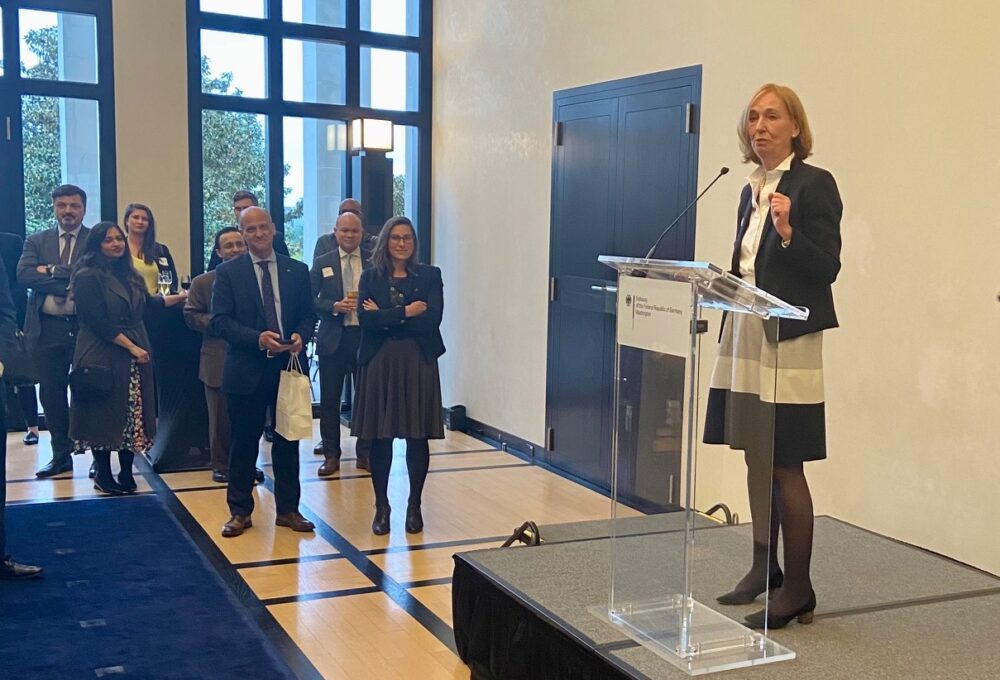Global Economic Disruptions and Transatlantic Alliances
The COVID-19 pandemic, the war in Ukraine, and climate change have created huge disruptions – with lasting implications at the global, national, and local levels. Particularly on the economic side, many parts of the world have been experiencing stagnation and inflationary trends, both of which have led to supply chain disruptions, food shortages, and rising prices for commodities like energy and food. As a result, economic fragility has highlighted – and exacerbated – alarming trends when it comes to economic welfare, social unity, and political cohesion.
At this critical juncture, the American Council on Germany and Atlantik-Brücke convened their annual transatlantic conference in Washington, D.C. to explore the recent economic impacts to the transatlantic partnership – and worldwide.
Ambassador John B. Emerson, Chairman of the American Council on Germany, and Sigmar Gabriel, Chairman of Atlantik-Brücke, opened the conference by welcoming everyone back to Washington, D.C. since the last German-American Conference in the United States in 2018. Noting how much has changed since then – changes in government on both sides of the Atlantic, the COVID pandemic, Russia’s war in Ukraine, and so much more – both stressed the importance of face-to-face meetings to exchange views on shared issues. The war in Ukraine has made clear that the post-Cold War era is over, and the relative peace enjoyed by Germany has ended. In this context, the German-American partnership has regained relevance. “Germany and Europe must take on more responsibility, but a more sovereign Europe should mean more cooperation with the United States to provide greater burden-sharing,” said Mr. Gabriel. Ambassador Emerson added that strong economies are critical domestically and for foreign policy, stressing that economic stability is key to ensuring the health of our respective democracies.
Germany and Europe must take on more responsibility, but a more sovereign Europe should mean more cooperation with the United States to provide greater burden-sharing.Sigmar Gabriel
In a conversation moderated by Ines Pohl, Washington Bureau Chief for Deutsche Welle, entitled “Setting the Stage: Geopolitics and the Global Economy,” Jacqueline Ramos, Deputy Assistant Secretary at the Bureau of European and Eurasian Affairs, U.S. Department of State, and Dr. Norbert Röttgen, Member of the Bundestag (CDU), highlighted a range of issues confronting Germany and the United States. In the near term, the invasion of Ukraine by Russia and the rise of autocratic governments around the world must be a top priority – we must endure and stay together to effectively confront these challenges. Dr. Röttgen noted that the clock is ticking for Europe and stressed that Germany must show “leadership reliability” to strengthen its ability to act, not against the United States, but in cooperation as partners. Both speakers identified China as the long-term challenge, suggesting that Beijing’s ambitions are of a much larger order of magnitude than Moscow’s – President Xi wants to change the global order while Putin just wants to alter the post-Cold War European security order. China poses threats to Germany and the United States economically and in terms of security. IP theft, economic practices, and supply chain dependencies all are detrimental to Western economies and both countries are taking steps to address these issues.
Dr. Röttgen suggested German policy is changing slowly but cannot happen overnight. German industry argues that the Chinese market is so big that they cannot afford not to be there. However, changing course long-term is critical otherwise a Taiwan conflict will have a similar shock effect on the German economy as Russia’s invasion of Ukraine. While Germany and the United States have differing approaches to China, Ms. Ramos explained that concerted efforts are being made to build resiliency together. For example, soon after Chancellor Scholz spoke with President Biden, the German government announced new measures on 5G policy to address security concerns in telecommunications infrastructure. Overall, effective Chinese deterrence can be achieved by Germany, Europe, and the U.S. sending the clear message that Xi should not underestimate the unity of the West and should not repeat the mistakes of Putin. Unfortunately, said Dr. Röttgen, our mutual goals of peace, prosperity, and the protection of our planet are impeded by geopolitical struggles, such as that with China, but efforts must nonetheless continue to seek collaboration wherever possible.
To open the second day of the conference, German Ambassador to the United States Dr. Emily Haber shared her perspectives on the transatlantic relationship over the course of the last five years during her tenure as an ambassador, with its many ups and downs. In terms of what has not changed, Germany and Europe remain dependent on the U.S. for security, and there is no issue where the U.S. doesn’t matter or have influence on Germany. Additionally, there is an incredibly stable infrastructure of relationships in science and research, in the military, and between businesses which helps make the partnership relatively resistant to politics. Russia’s invasion of Ukraine, however, was “a massive earthquake with tectonic aftershocks” which has ended the post-Cold War era, and the new one we have entered has not yet come into focus. In Germany, she explained there is a fear for the future world our children will live in, and long-held beliefs that peace was a constant in Europe, maintained by economic interdependency, have been shattered in a matter of months. Despite this massive shift, the war has fueled a renewed sense of Atlanticism, and German complacency of burden-sharing has been replaced by a recognition that the moral overtones which have driven German policy since the 1960s must now be based in greater realism. The challenge for Germany and Europe is to find a balance between Europeanism and Atlanticism now in which they are complementary to one another characterized by a shared rules-based order and pragmatic values to build coalitions against aggression. Following her remarks, Ambassador Emerson led a conversation with Ambassador Haber.
Russia’s invasion of Ukraine was a massive earthquake with tectonic aftershocks.Dr. Emily Haber
In a conversation entitled “Creating a Foreign Policy for the Middle Class,” Elizabeth Baltzan, Senior Advisor for the United States Trade Representative, and Sigmar Gabriel explored what exactly a foreign policy for the middle class means and how it impacts the transatlantic alliance. Ms. Baltzan explained that the root of this policy goes back to the Atlantic Charter in 1941, which states “a desire to bring about the fullest collaboration between all nations in the economic field with the object of securing, for all, improved labor standards, economic advancement, and social security.” In other words, international trade policy, a part of foreign policy, should provide economic security for working people. And going a step further, if you don’t provide economic security for working people, then you risk democracy. Citing National Security Advisor Jake Sullivan’s recent speech at the Brookings Institution on the Biden Administration’s international economic agenda, Ms. Baltzan noted that many U.S. initiatives, including the Inflation Reduction Act, aim to strengthen the U.S. economy to confront Chinese trade practices and domestic economic policies. Noting the criticism of the IRA in Europe, she urged people to understand the importance of the bill in creating U.S. jobs and in meeting the Paris climate commitments, elements that end up benefiting the EU-US alliance. Overall, both agreed that each side shares common goals, despite some disagreements, and that collaborative efforts to create multiple modes of production are needed to reduce dependencies and increase resiliency in global supply chains.
The Atlantic Charter states a desire to bring about the fullest collaboration between all nations in the economic field with the object of securing, for all, improved labor standards, economic advancement, and social security.Elizabeth Baltzan
In a spirited discussion moderated by Julia Friedlander, CEO of Atlantik-Brücke, Dr. Emily Blanchard, Chief Economist for the Under Secretary for Economic Growth, Energy, and the Environment at the U.S. Department of State, and Dr. Philipp Steinberg, Director General for Economic Stabilization and Energy Security at the German Federal Ministry for Economic Affairs and Climate Action, examined the challenge of ensuring economic security while also promoting value-based trade goals and how governments and private sector can work together to provide both. The war in Ukraine posed significant immediate risks to economic security in Germany. Still, the crisis has served as a catalyst for structural change with accelerated reforms of laws and administrative procedures that are boosting Germany’s efforts to achieve climate goals while alleviating the immediate energy crisis. Dr. Blanchard explained that Putin’s invasion has sharpened the focus on the global economy and how the dependencies impact almost everything in our daily lives. Governments have a vital role to play in moderating where the market doesn’t get it right. Both speakers concurred that problems won’t get solved alone, and the government must give tools and incentives to help the private sector contribute to solutions. In terms of values-based trade, there will always be conflict with pure economic interests and needs which may at times, be a priority and more dominant. However, transparency and space for consumers, together with pragmatic standards from governments regarding fundamental worker rights or environmental standards, to influence companies’ values can be more effective than a fixed set of rules or trying to impose values on other countries.
The various crises of the last three years have had a significant impact on globalization and economic competitiveness which was analyzed by Heidi Crebo-Rediker, General Partner at America’s Frontier Fund, and Steffen Kampeter, CEO of the Confederation of German Employers’ Associations (BDA), in conversation with Luiza Savage, Executive Editor of Growth at Politico. Noting that there has been a Zeitenwende in defense and security policy, Mr. Kampeter stressed the need for such a transition in economic and social affairs as well in Germany and at the EU level. Taxation, specifically payroll taxes, remains too high, and bureaucratic red tape on a range of issues remains much too complicated. The political debate in Europe criticizing the Investment Reduction Act really isn’t an economic debate, he said, because “governments cannot subsidize competitiveness.” Ms. Crebo-Rediker explained the conversation about IRA fairness issues really must be seen instead in the context of the climate change imperative. The Biden Administration has laid out a much more structured approach to address and identify challenges to economic competitiveness such as supply chain vulnerabilities. Turning to the auto industry’s shift to EV, both agreed that the EU and U.S. have a clear mutual interest in collaborating to confront the Chinese auto industry’s explosive growth. However, Mr. Kampeter stressed the issue isn’t the ability of the auto industry to produce more EVs, but rather the more complex infrastructure which is required, including batteries, the electrical grid, and storage capacity, which is lacking in both Germany and the United States. Ms. Crebo-Rediker suggested that a much greater focus on capital markets is needed in this regard because it is impossible to out-subsidize the Chinese. Another challenge to economic competitiveness is workforces – both in terms of quantity and quality. There is a lack of skilled workers both for current and future jobs and there are estimates that 50 percent of current workers will need retraining and upskilling to support the advanced manufacturing industry. A greater effort is required to maintain a robust social compact to mobilize labor forces and to avoid the conflict and recent unrest seen in France.
How business and governments can collaborate to support shared visions and common goals was at the core of a conversation with Elissa Alben, Vice President and Head of Global Trade Policy and International Government Relations at Pfizer; Jan Neutze, Vice President of EU Government Affairs at Illumina; and Hartfrid Wolff, Communications Department Head at the German Federal Ministry of Digital and Transport, which was moderated by Dr. Steven E. Sokol, President and CEO, American Council on Germany. Ms. Alben stressed how Pfizer’s core values and purpose drive what the company does, citing the company’s long-term commitment to providing better access which would not get the attention it deserves if not included in the value statement. In the case of COVID, the vision helped support the common cause of developing a vaccine together with public support. Mr. Neutze strongly argued that companies could promote welfare while striving to make a profit and that governments can play a role in this. The human genome project was originally government funded and created an entirely new sector in our economy. Numerous companies now utilize the DNA sequencing from that project for a range of biotech products, including the COVID vaccine, which saves lives but also creates jobs and profit for the companies. In many fields, but especially in biotech, governments can play a critical role in establishing data frameworks that enable innovation and ensure privacy. Digitalization and remote monitoring, supply chains, and digital therapeutics all are data-driven. Mr. Wolff concurred stating that government can provide tools to the private sector while also making the case to the public why these tools are essential. The key is to be transparent and make things tangible in people’s daily lives – show there is value to them and how they will benefit. All agreed that “government must make solutions possible and not create ways to control it” because companies want to be innovative and have the potential to improve people’s lives dramatically.
At the moment, the European Union and the United States are more aligned in terms of climate policy and goals to confront climate change than they have been in many years. However, the approaches are not always identical, and the sustainability costs in terms of finances and implementation of new technologies remain challenging to achieve this needed transformation. Dr. Monika Griefahn, Chair of the Board at eFuel Alliance, Oliver Hill, Chief Representative and Head of Corporate Development at VNG AG, and Emily Kreps, Managing Director and Head of ESG at Deutsche Bank, provided an overview of some of the climate and business strategies being pursued in a discussion moderated by Samantha Gross, Director of the Energy Security and Climate Initiative and a Fellow in Foreign Policy at the Brookings Institution. Mr. Hill described how VNG has had to immediately find alternative sources for the one-third of the natural gas the company received from Russia and now is acquiring and building biogas plants, researching hydrogen as a replacement for natural gas, and utilizing carbon capture and storage technologies. Dr. Griefahn explained the benefit of efuels which are produced with the help of electricity from renewable energy sources, water, and CO2 from the air and do not release additional CO2. However, efuels in some cases, require more energy, even if from renewables, to produce. Most important when trying to meet climate targets is not to put all your eggs in one basket. This transformation must happen quickly, and there is no time to wait for a magic silver bullet. Ms. Kreps explained that Deutsche Bank has sustainable finance goals to help clients with the capital they need for long-term goals. Even oil and gas receive financing, but only if there is a transition plan based on climate science. Recognizing the huge investment needed to meet climate goals, estimated as high as $2.5 trillion, governments need to make the case for climate projects in the context of other topics and priorities such as workforce development, education, and job creation.
In the final session of the conference, Dr. John Lipsky, Peter G. Peterson Distinguished Scholar at the Henry A. Kissinger Center for Global Affairs and a Senior Fellow in the Foreign Policy Institute at Johns Hopkins School of Advanced International Studies, Ludovic Subran, Chief Economist at Allianz SE, Friederike von Tiesenhausen, Global Head of Public Affairs at Bloomberg, together with moderator Sara Schonhardt, International Climate Reporter at E&E News, discussed the need for a new global economic policy for the transatlantic community after the turbulence of the last few years. Dr. Lipsky highlighted how treaty-based multilateral institutions like the IMF and WTO are not effectively addressing issues because of decisions by G20 leaders to create their own policies based on each crisis. The effect has been much less unanimity, like what had existed during the financial crisis, and more calls for reforms to the institutions. Reforms, however, have been difficult because advanced economies have diverging views from the recipients of aid on what the reform agenda should look like. Ms. von Tiesenhausen added that there is a desire to find the right transmission tool, but it has been difficult to get information on whether aid projects are sustainable, and the private sector has been more domestic focused and not interested in new foreign projects. Mr. Subran suggested that there is a disconnect between the political elite that sees the need for global aid and publics which focus more on domestic issues. All agreed that emerging economies were hit hard by the Covid pandemic, higher food and energy prices, and the impact of climate change, so there is pressure to find a solution, and many are suffering from debt distress, compounded by a drying up of Chinese lending. There were diverging views on what should be done to aid the Global South with Dr. Lipsky suggesting the best strategy to help emerging economies is for the advanced economies to avoid an economic downturn. Ms. von Tiesenhausen felt that regional development banks could play a larger role. All agreed on the need to reduce inflation to lower interest rates so that it is easier to service public debt.
Together, the transatlantic alliance needs to raise the economic floor for our citizens which in turn builds support for our international allies and the global economy.Senator Chris Murphy
Senator Chris Murphy (D-CT), Member of the Senate Committee on Foreign Relations and Chairman of the Subcommittee on Near East, South Asia, Central Asia, and Counterterrorism, concluded the conference with a keynote highlighting the necessity for a strong alliance between Germany and the United States. There are many reasons why our countries need to reduce friction between us, including unity against rising autocracies, an existential war in Ukraine to maintain the norms we believe should guide our societies for the next 70 years, and the rise of China. On all these issues and more, coordination of our policies, even if not always identical, is to the benefit of our communal interests. Senator Murphy stressed that the best foreign policy is an America with a strong democracy at home with values that can be promoted abroad. And regarding economic policy, each side of the Atlantic took things for granted and failed to recognize that the global economy we jointly promoted didn’t benefit average citizens enough. Together, the transatlantic alliance needs to “raise the economic floor for our citizens” which in turn builds support for our international allies and the global economy.
The 2023 German-American Conference was generously supported by Allianz and Deutsche Bank.

